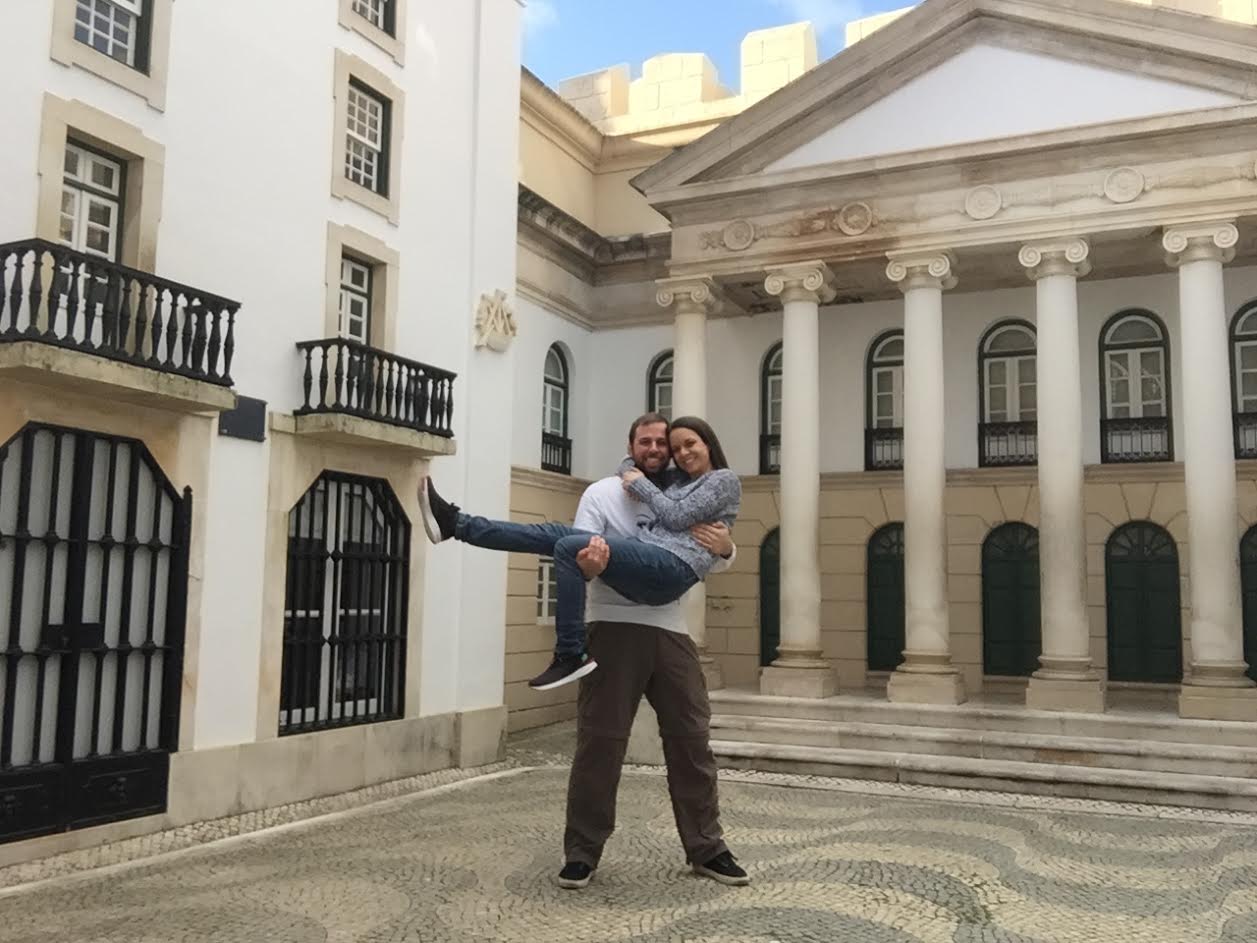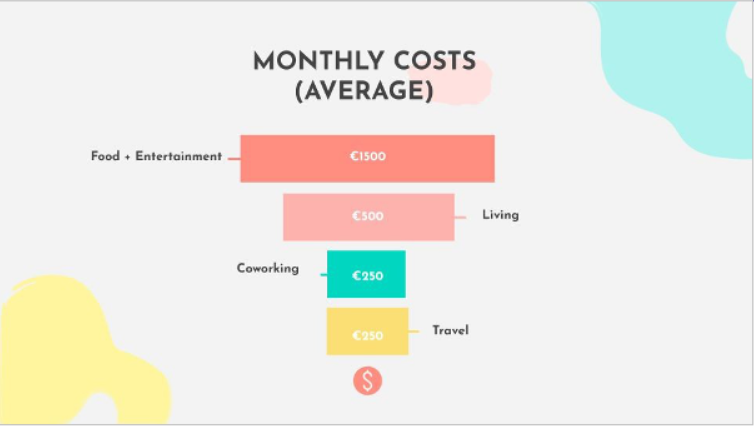Digital Nomad Tourism Featured for 1st Time in Croatian Media
May 11, 2020 - Digital nomad tourism is an obvious tourism strategy of the future. Thanks to Dutch entrepreneur Jan de Jong in Split, it made its first appearance in the Croatian media today.
Did you feel that?
It is not quite the strength of the famous Adriatic bura, but it is a wind of change.
What a week!
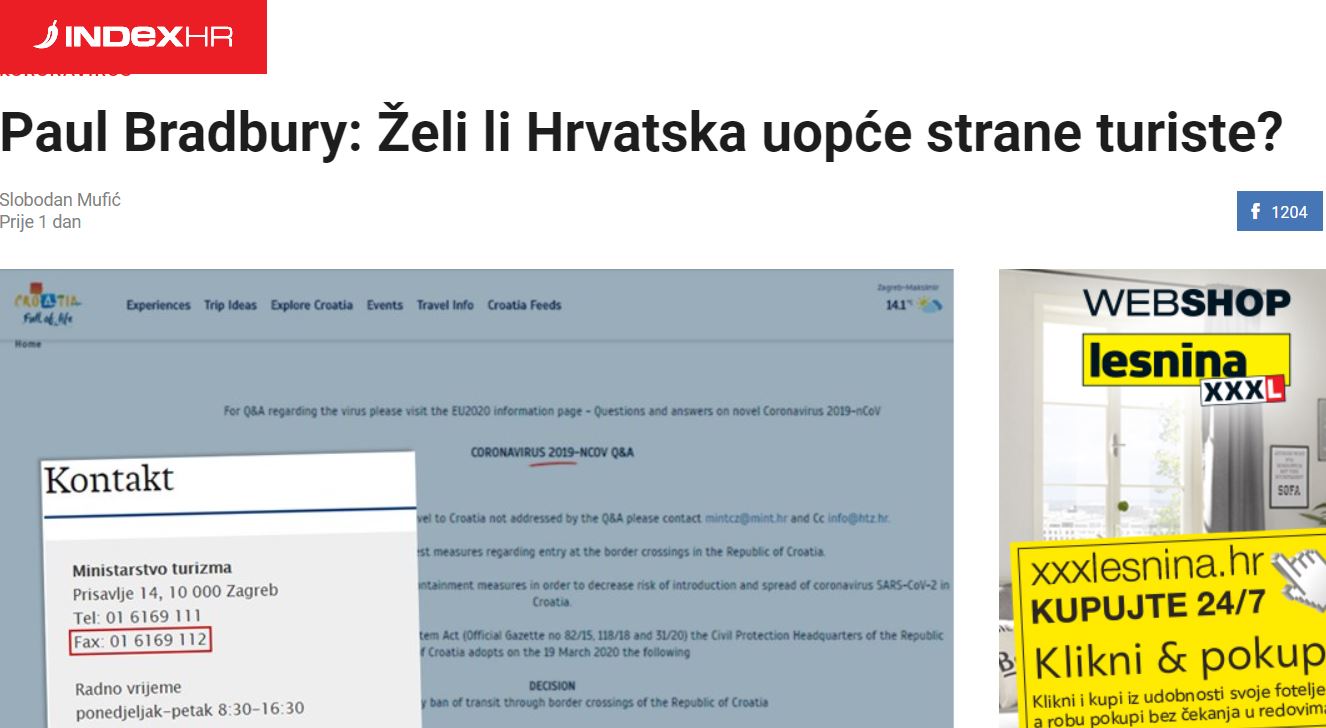
First of all, the Ministry of Tourism decided to upgrade from an email-free ministry, with the humble facsimile at the core of its communications strategy on its homepage...
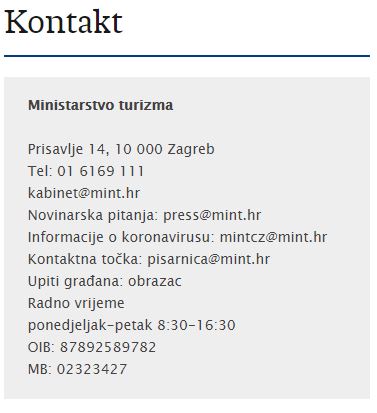
... to a totally faxless ministry, replaced by not one but FOUR email options.
Prior to that, some even more progressive news in the digital era - the concept of digital nomad tourism as a strategy for the development was muted for the first time at a national Croatian tourism conference, SMART Tourism 5.0.
Dutch entrepreneur Jan de Jong, who has already created hundreds of Croatian jobs in internet marketing since moving to Split in 2006, was the man behind the initiative after reading some articles on TCN. You can see him put forward his arguments for Croatia as a digital nomad tourism destination in the conference video clip aboe.
De Jong's arguments resonated with many, and today another milestone for the digital nomad tourism initiative, as de Jong featured in a full-page interview with Vecernji List. The first - but certainly not the last - time that digital nomad tourism has featured in the Croatian national media.
It is almost a year since TCN started writing about the potential of digital nomad tourism in Croatia in Branding Croatia: 5 Gifts and Trends to Focus On.
On June 19, 2019, I wrote an article called How Croatia is Becoming Increasingly Attractive for the Digital Nomad Lifestyle.
In it, I wrote about the daily routine of a Russian-Ukrainian couple in Munich, and their daily routine in Jelsa from April 1 - June 30:
Let me give you an example from a meeting I had yesterday with a very nice Ukrainian and Russian couple in their early 40s here on Hvar. They live in Munich and he works for an IT company, where the boss has decided that his staff would be happier and more productive if he let them work remotely 10 months a year, with only 1-2 months required in the office. The boss himself only spends 6 months in the office and has arranged things whereby he can spend the other half in the warmth of Asia.
The couple I met last night decided that they wanted to use the opportunity to travel and to experience life in different countries and integrate into communities. The wife came with her family to Jelsa 19 years ago on holiday, and the memories were warm enough for them to decide to put Jelsa into their plan, and so they have been here for 3 months, from April to June, with plans to do exactly the same next year. From Jelsa, they will move to Sicily for 2-3 months and then onto Portugal or Spain. And after the required stop in Munich, it will be back to Jelsa next April.
The working day is just like any other for someone working online. Deadlines, phone calls, emails, contact with bosses and colleagues. But all this is done remotely. What is different is that each morning starts with a swim before work and a swim after work. They shop in the market, drink coffee in the cafes, and eat in the restaurants. They are even learning Croatian, as they want to get the most out of the community experience. Friends and family come to visit, and they too visit the market, cafes and restaurants. The couple also has many friends with a similar lifestyle, who will be following the places they stay in and consider them for their own digital nomad experience.
There will be one BILLION digital nomads by 2035, according to some estimates, and there is nowhere in Europe better placed to host them than Croatia, which offers a unique combination of safety, accessibliity, affordability, tourism, great food and wine, good English, good Internet, and a fabulous lifestyle.
This is a sustainable tourism which will not devastate the coast or succumb to overtourism. A tourism which will suit different people with different needs. As everyone is emigrating from Osijek, for example, meet the digital nomad from Denver who thinks Osijek is one of the best places to be on the planet.
To learn more about digtial nomad tourism, check out the Total Croatia guide.
Digital Nomads Enter Croatian Tourism Conference Strategy Debate for 1st Time
May 6, 2020 - A milestone for progressive Croatian tourism strategy yesterday, as the enticing prospect of a tourism future with a focus on digital nomads was discussed at a Croatian tourism conference for the first time.
A seismic event in tourism strategy thinking took place at an online Croatian tourism conference, SMART Tourism 5.0 yesterday, an event which might have gone largely unnoticed at the time, but the seed it planted paves the way for a new generation of thinking in determining Croatia's tourism future.
For the first time that I can recall - and I follow the industry a lot - the concept of catering to digital nomads as a cornerstone of Croatia's tourism strategy was mooted at a national tourism conference.
The first panel was hosted by the conference "Is Croatian 365 tourism possible?", with the topic - what tourism will look like in the coming months, what it means for Croatia and what are the potentials of domestic tourism, whether the crisis creates an opportunity for year-round tourism and the activation of less popular destinations and the creative development of new products and local contents.
Among the panelists was Dutch entrepreneur Jan de Jong, who has been living in Split since 2006, managing to create hundreds of jobs in the online marketing business. A very vocal proponent of positivity and economic opportunity in Croatia at a time when so many are emigrating, de Jong's message at the conference (which you can see in the video below) was of the potential not only of Croatia's agriculture and agrotourism business, but also the tremendous opportunity the country has now for a tourism reset, moving away from cheap mass tourism into a world which meets the modern traveller.
As de Jong noted, there will be a projected 1 billion digital nomads, or remote workers, in the world by 2035, a date which may have been brought forward by the corona reality. More businesses, including his own, have been forced to adapt to employees working from home, and many have found the experience not only positive in terms of increased productivity, but also employee contentment.
With the ability of an increasing number of people to work from home or anywhere in the world with good Internet. there is a huge future tourism market - currently untapped - which may not seem obvious to those with their current one-dimensional 'sun and sea' tourism mindset, but one which has the potential to fill Croatia 12 months a year and build up communities, rather than witness the painful emigration we are currently witnessing.
As de Jong noted in his panel contribution, Croatia has MANY advantages which make it arguably the most attractive destination for digital nomads in Europe - safety, English widely spoken, accessible from the rest of Europe and the world, fantastic nature, great food and wine, a VERY relaxed lifestyle, fabulous tourism, very affordable by EU standards. The list goes on.
Thanks Jan, I was thrilled to hear you talk so eloquently about the possibilities for developing tourism for digital nomads in Croatia. Digital nomads was one of the five areas I wrote about last July as great opportunities for Croatian tourism to reduce dependence on mass tourism on the coast and the enironmental devastation of the Adriatic. What were the other four? You can find out in Branding Croatia for the Future: 5 Gifts and Trends to Focus On.
Digital Nomad Life in Croatia: Mike and Tara Shubbuck from Washington DC to Zagreb
April 5, 2020- As the number of digital nomads rises globally, some are choosing to spend some of their time in Croatia. Continuing our TCN series meeting international digital nomads calling Croatia their temporary home. Meet Mike and Tara Shubbuck from Washingon DC but now in Zagreb.
As recently featured on TCN, the world is projected to have a billion digital nomads by 2035, people from all over the world doing all manner of jobs and business with one thing in common - a flexible, mobile workplace connected to the Internet. If even a fracture of that number becomes a reality, the economic opportunity for countries which can attract these wealth-generating individuals has the potential to dwarf Croatia's current tourism revenues. And there are few countries better placed than Croatia to take advantage. Safe, beautiful, great gourmet scene, top tourist destination, English is widely spoken, well connected to other destinations, and a superb lifestyle.
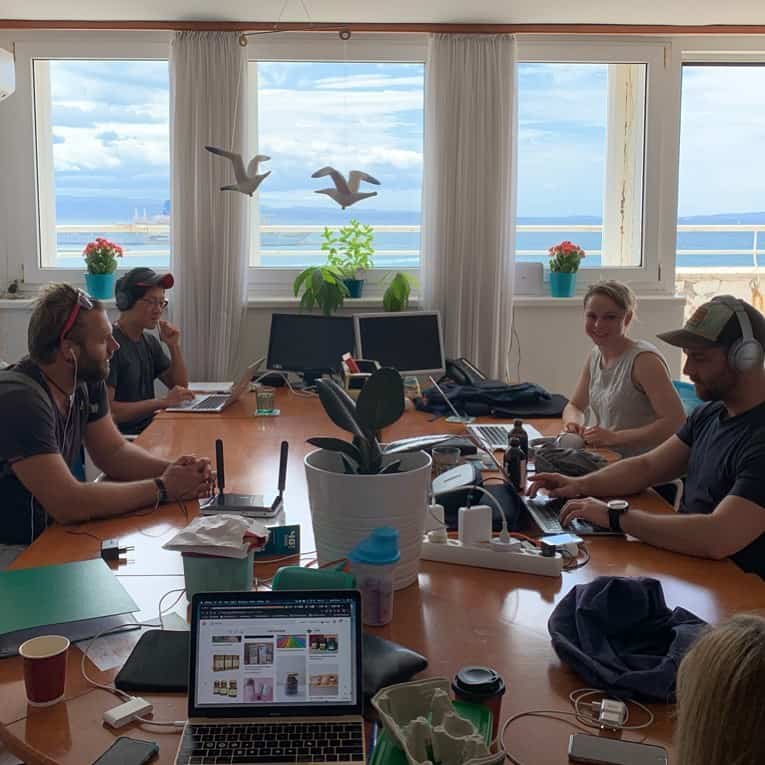
In order to look at the issue in more detail, we have decided to look at some of the digital nomads who have Croatia in their lifestyle plan, and to find out why Croatia, what Croatia offers, and what are the things that countries should be looking out for to take advantage of this economic opportunity. I am very grateful to Tanja Polegubic from Split's waterfront co-working space, Saltwater in Split (see location below) for her help in connecting me to various digital nomads using her space.
Our next digital nomads in Croatia are Tara Shubbuck and partner Mike, currently in Zagreb, a long way from home in Washingon DC.
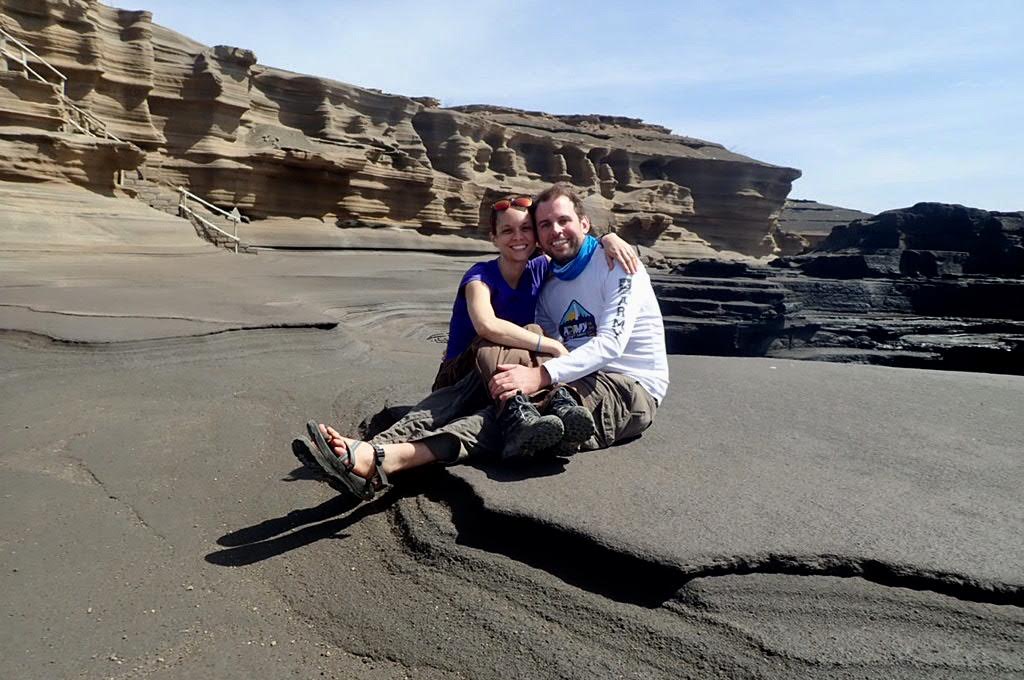
You are one of a growing number of digital nomads. Tell us briefly who you are and what you do.
We’re Tara and Mike, a married couple in our thirties from Washington, DC. At the end of 2019, we split off from our location-dependent jobs to pursue a fully remote lifestyle. Over the past four years, Tara created a side business doing writing work mostly for Skyscanner and The Washington Post (https://tarashubbuck.com). Once the frequency of projects reached a sustainable level, we decided that 2019 was the right time to start that transition to become digital nomads. We ended 2019 with Tara leaving her full-time marketing job to focus on her freelance work, while Mike transitioned to being a fully remote technical writer and trainer.
Working from your laptop rather than in an office seems like the dream lifestyle. What are the main pros and cons?
We’re still new to the digital nomad lifestyle, but one thing that has been really nice is living in a time zone ahead of those we work with. We’re more night owls than early birds, so we tend to stay up later anyway. This frees up the morning for personal activities, and then by lunchtime, those we work with are starting to sign online for the day.
Another major perk of this lifestyle (prior to the coronavirus pandemic lockdown!) is that you are, in a way, always on vacation. You can move whenever you want a change of scenery, and what you pay for housing, food, etc. are your standard costs of living, not additional expenses like those you would incur when you take a vacation away from your permanent residence. And because of that, we can select destinations that have a lower cost of living compared to the United States, and particularly DC, where rent and activities are expensive.
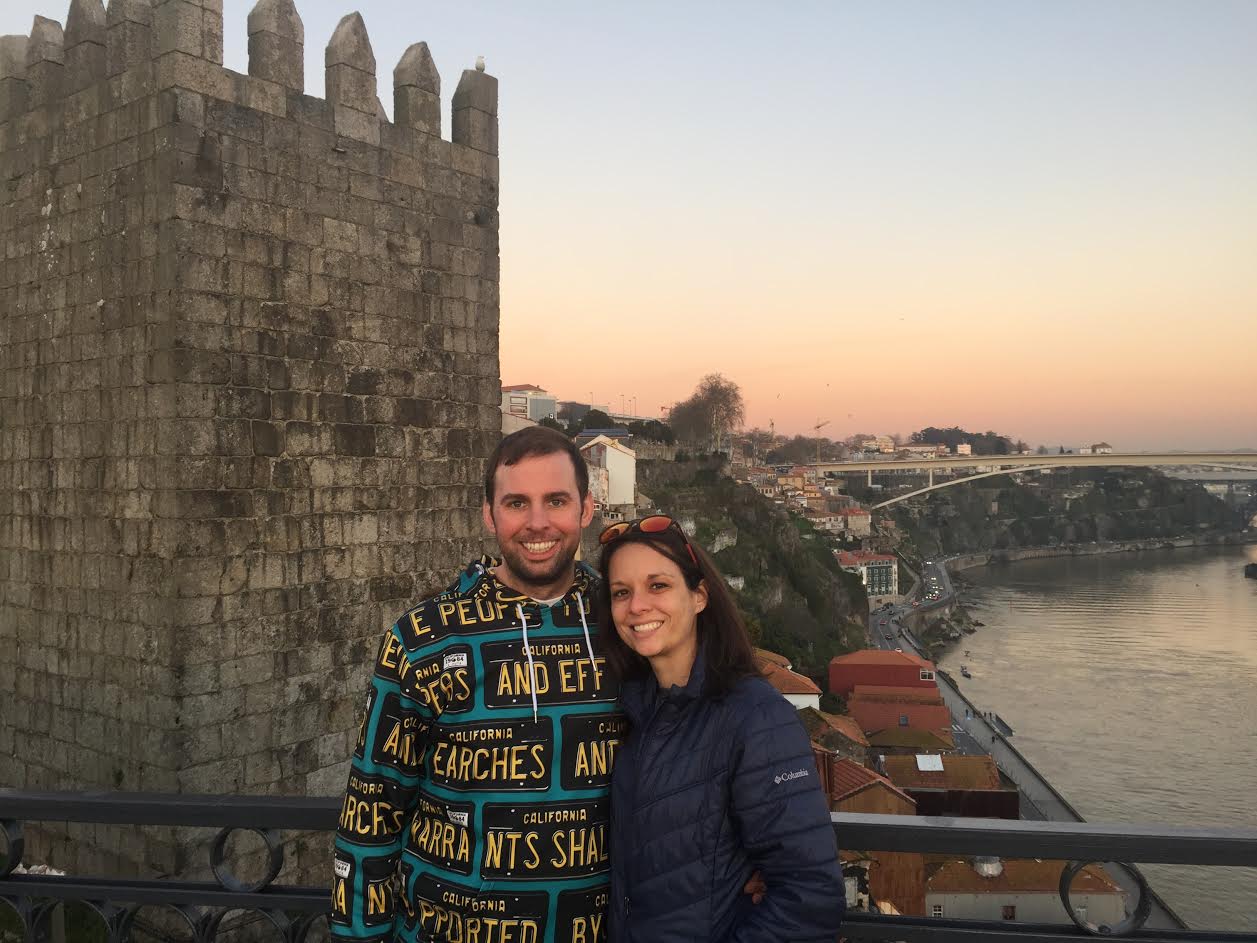
As far as cons go, both of us are social people, so not being surrounded by friendly coworkers all day is a bit of a negative. We had become really good friends with some of our former coworkers, so reduced socializing has definitely been difficult for us. We arrived in Croatia just days before the country closed its borders to foreigners and then shut down essential businesses due to the pandemic, so we haven’t had the opportunity to meet locals or other expats here. We’ve been doing regular happy hour video chats with friends and family, so that’s filled the void a little.
The lack of job security that comes with freelancing is also a con. Due to the current pandemic and the economic upheaval it’s caused, Tara’s work has been drastically reduced. Her assignment load has fluctuated over the years, so we already knew how volatile this line of work could be. It’s something we’ve prepared for, and anyone thinking of becoming a digital nomad should do the same. Creating a safety net for yourself is not optional. We wrote a lot about budgeting and saving for long-term travel in a book that we self-published a few years ago called Create Your Escape: A Practical Guide for Planning Long-Term Travel (more at http://createyourescape.today/).
Laptop living gives you the freedom to travel and choose your place to live. Where are the global hot spots currently for digital nomads?
If you put the pandemic aside, our plan for this remote work lifestyle was not necessarily to travel to cities that are set up perfectly for digital nomads. When we set our minds to being location independent, we had a strong desire to live in cities we had visited before and fell in love with, like Zagreb.
From 2012-2013, we took a career break and traveled the world (blogging about it at https://twotravelaholics.com). Along the way, we noted which cities we could see ourselves living in and promised each other we’d return. So that’s what we started out doing, first in Portugal and now Croatia. Others that we’d like to return to include Amsterdam, Singapore, Bangkok, Ho Chi Minh City, Cape Town, and Vancouver. When the pandemic subsides and it becomes possible to travel freely again, we want to explore more of Eastern Europe (and Croatia, if we’ll have the opportunity for intercity travel before our tourist visa expires).
You chose Croatia and specifically Zagreb - why?
As mentioned, it’s one of the locations we fell in love with years ago. The people are friendly, there are many opportunities for outdoor activities, there are rich culture and historic sites, and you really can’t beat the food, beer and wine. We lived for the craft beer scene in the US, and while it’s different abroad, we haven’t had a Croatian beer that we didn’t like (we were introduced to Medvedgrad nearly a decade ago and still love its brews).
What are the most important things a destination should offer to be most compatible for the digital nomad lifestyle, apart from that all-important good WiFi?
The answer is going to change from person to person. We don’t want to put ourselves at risk, so safety and comfort are top priorities. After that, we gravitate toward larger cities. We love city life, being able to attend events, go to concerts, explore museums, and get lost in the winding streets of unfamiliar neighborhoods. Great cuisine and local beer and wine are important, too, of course.
We’ve been in coworking spaces in DC, but we haven’t had the opportunity to try them abroad yet. The concept certainly appeals to the digital nomad lifestyle. There’s the intermingling of businesses, work equipment, social interaction, and, of course, just the ability to work in an atmosphere where you can be productive that is outside of a café or where you are currently living.
What are the competitive advantages that Croatia has to attract more digital nomads?
Three things that make Croatia a very attractive destination for digital nomads are safety, affordability, and the fact that many locals speak English. We always want to learn as much of the local language as we can whenever we travel, but you’re only going to be so proficient even after a few months of trying your best.
One thing that destinations can supply that would attract digital nomads and make their transition easier is a centralized website that houses relevant resources like apartment rentals, coworking space information, an events calendar, and instructions for a visa extension. All this information is scattered across the web—some sites in the local language and others with an English option—so the more hurdles you introduce, the more likely you are to lose potential visitors. Digital nomads are going to be spending a lot of time and money in your city—not to mention posting about it on social media—so making an investment in attracting them should pay off pretty quickly.
Connect with Tara and Mike! They’d love to chat with other TCN readers (https://www.linkedin.com/in/mikeshubbuck/ and https://www.linkedin.com/in/tarashubbuck/).
To learn more about Croatia for the digital nomad, check out the Total Croatia Digital Nomad guide.
Are you a digital nomad in Croatia who would like to be featured in this series? Please contact us on This email address is being protected from spambots. You need JavaScript enabled to view it. Subject Nomad
Creative Young Croatian Returnees: Uniting Artists & Business to 'Fill the Void' with Culture
February 21, 2020 - Winter life on the Dalmatian coast is a fraction of its summer energy. But not everyone is hibernating, and indeed some are finding very creative ways to fill the void.
Last night, I entered a souvenir shop to find a performing artist was crouching inside a Coca Cola fridge. When not in a fridge in a closed shop on the usually empty-all-winter Zadarska Ulica, Mia Kevo is dancing. Of late, Mia runs choreographed and improvised dance programs for people with disabilities around Croatia. This is one of many local and international artists - including photographers, filmmakers, urbanism researchers, who are part of the program for Culture Hub Croatia’s (CHC) PRAZNINE 2020 - an international artist program, loosely translating to VOIDS 2020. The program makes use of spaces which sit empty in winter due to unsustainable tourism practices - and is sign youth who are gaining expertise outside, are taking steps to change things in their hometowns - and in general, being supported by local businesses who see the need to re-energise coastal cities.
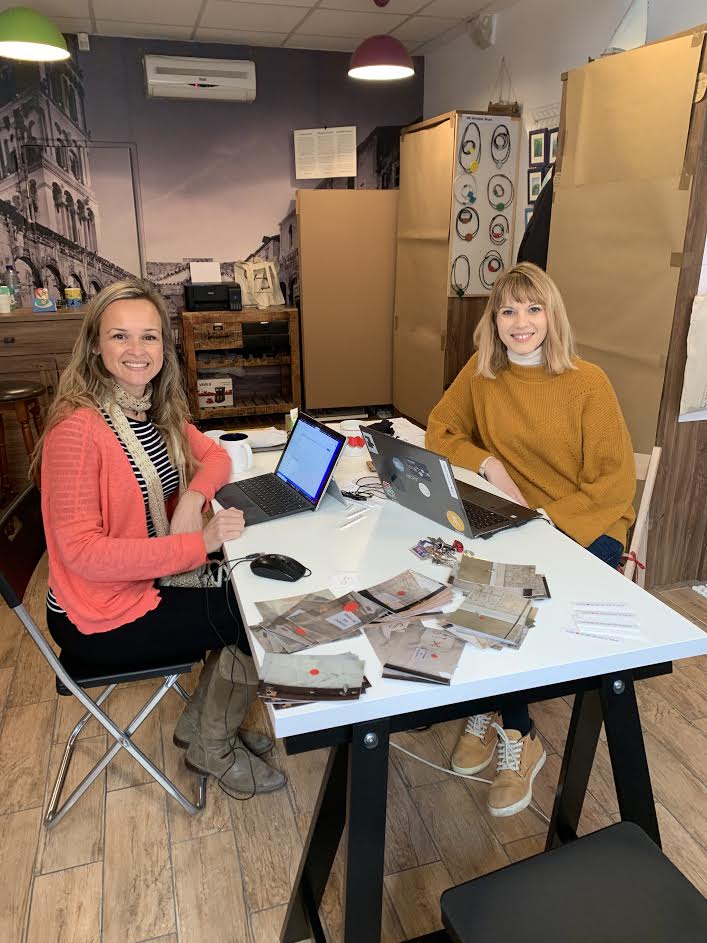
I’m writing this sitting in a pop up coworking space on Bosanska 4 in Split with one of the CHC founders, Marina Batinic, originally from Split and based between her hometown and Brussels. In the summer, this pop up cowork space functions as a souvenir shop - across the Game of Thrones Museum. The owner, Sanja, opened her doors and supports the space for artists initiative. Like so many, hers is a business reliant upon crowds - who disappear by around 1 November. I’m surrounded by handmade items from Dalmatia - from jewelry, paintings, sculptures and behind a brown box a sign for ‘magical bottles’. I’ll have to come back in the Summer to peruse the items for sale. These are the kind of sustainably-minded thinking businesses to support. (Looking out the window, I note even the GoT museum is boarded up). Marina is part of the culture hub trio, also included Jasmina Šarić and Kristina Tešija - all who are making a commitment to bringing international, cultural initiatives to their hometown, operating based on citizen support.
Sitting here with Marina, we discuss the changes we’d like to see and the challenges each of us has encountered - from local mindset, to tiring after swimming against a wave bigger than just a few people. Personally, being a champion for Remote Working and digital nomads (for which this country is an ideal destination) conversations like this are common - if only with a small handful of those ‘taking things into their own hands’. Sometimes, it’s like an inner tennis match going on, when you think about the number of people leaving - and yet, the number interested in coming. So why aren’t these people coming back?
Infrastructure.
A lack of faith in a system they left.
Easier (perhaps) living on greener pastures. But is it, really?
In the last month alone, I have a renewed optimism, from reading and speaking to members of the upcoming Day One tourism conference, and people - with established careers outside of Croatia, choosing Croatia or coming back - coming back due to the need for role models and mentors. In the words of Mate, one such accomplished gentleman among them, “if I don’t who will?” Thank you, Mate. Are there more like you?
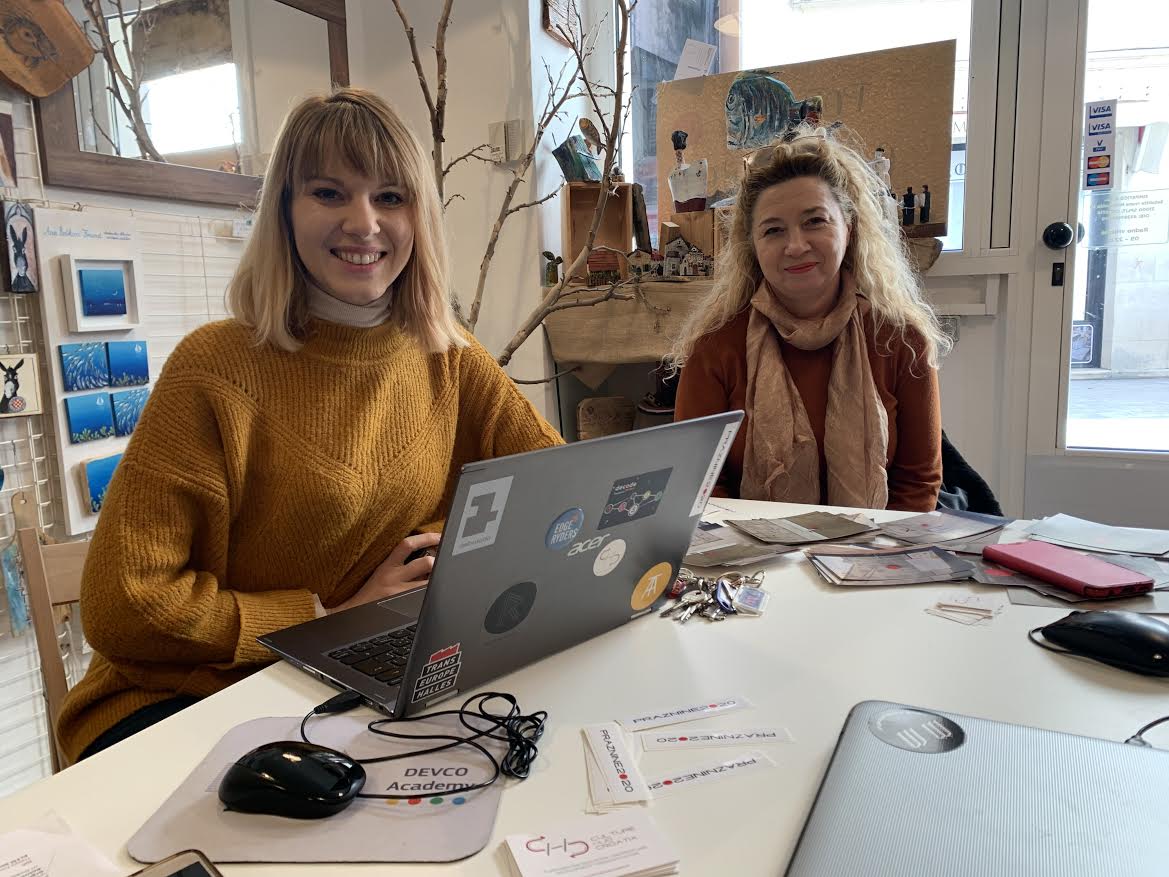
To return to the program, which does more than show this is an ideal, if under-utilised place for activity in the off-season, Marina shared more about the motivation and thinking behind PRAZNINE 2020.
“We invited artists from the region because the aim was to bring their artistic production more closer to the people. We’re not used to seeing contemporary art production at all and we don’t really collaborate in the region. We wanted to use arts to facilitate this dialogue and understanding. We have artists from North Macedonia, Albania, Kosovo and Bosnia. We want to meet these people and understand their work.
This is why we chose to have ‘open studios’ - even people who don’t understand contemporary art - to make people interact.
These Balkan countries need more dialogue. We wanted to use art as a means [for this].”
CHC are part of a wider international network, and now bringing their international connections to their hometown.
“We didn't want to limit the program only to the arts and open studios but we opened our calendar to the local community and other civil society organisations who were able to make their proposals for events and organize them in one of these spaces. In this way we allow everyone to shape their own city and gain back the ownership over it.”
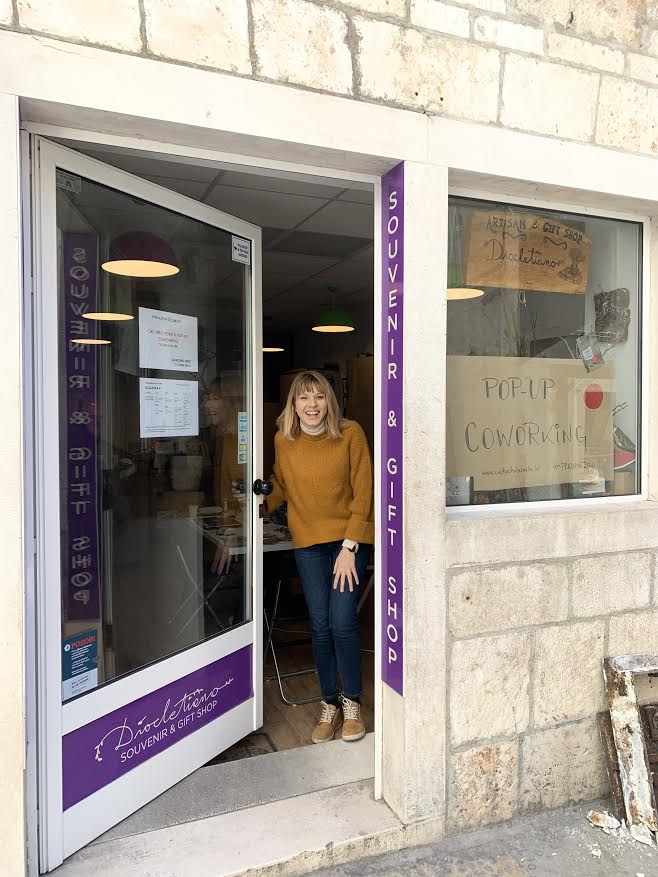
Sitting here, our joint guesstimate 60 to 70 per cent of the Split palace and the surrounding area is empty over winter. In setting up for their event, 35 promotional red dot stickers were printed - to be placed on empty “boarded up” businesses. They were used up in a matter of minutes.
For the finalé event, representatives from the European Creative Hubs Network (EHCN), Luka Piskoric from Poligon Ljubljana and Istanbul’s Atölye’s Atılım Şahin are coming. It is a great opportunity to see what is happening with Creative Hubs in the region on a wider scale.
--
WORTH RETURNING? IF ONLY THE “VOID” SEASON
In an era which is increasingly enabling and empowering remote work and digital nomadism - why isn’t the mini-Croatia in Dublin and the like thinking about basing here? If only during the “off-season”. It sure is sunnier. And with making use of empty spaces - all CHC had to do was knock on the door and ask (how novel). CHC prove it is possible.
Initiatives like these - a pilot project in the eyes of CHC, but hopefully an enduring one - are bringing life back. It no longer needs to be a smoky cafe and people futilely talking about politics when (if) you return. It’s connection with a cultured hit.
It seems there could be. As we sat at Marulus Bar last night - and had this unique stone-walled bar (with smoke free zone) entirely to ourselves - Marina shared stories of the large number of people reaching out to CHC from outside of Split (its official base) and applauding them for their efforts. I had the pleasure of doing it in person. In one of countless cities ripe for cultural and digital nomad disruption.
PRAZNINE 2020 is filling the void you may be experiencing this Winter, and runs until 7th March 2020. To see the full calendar and full event descriptions, and bios of the artists (in English and Croatian, visit the page on Culture Hub Croatia’s website or the Facebook event page.
Want to know more about being a digital nomad in Croatia? Follow the dedicated TCN section.
Estonia, Leading European Digitization Path, A Great Role Model for E-Balkans
February 14, 2020 - So what is a Venezuelan living in Varazdin doing travelling to Budapest to collect an e-residency from the Estonian Embassy? Meet a role model for e-Balkans.
There's so much to say about Estonia. The Baltic nation is home to 1.3M citizens, and producing the highest amount of unicorns per capita (Bolt, TransferWise, Skype, and Playtech). It offers a comfortable 20% income tax flat-rate for private entrepreneurs and corporations, and last year 98% of its population declared their taxes electronically in less than 3 minutes.
Also, they started to implement Blockchain for hash-linked timestamps in their systems nine years ago. Yup! That's 2011. For reference, that's the year Steve Jobs died, and the then 3-year-old bitcoin closed at $4.72 on December 31st.
Today, however, we will focus on their e-residency program, launched in 2014 by the e-nation as part of their Country-as-a-Service plan.
Last Thursday, February 6th of 2020, I traveled to the Estonian Embassy to Hungary in Budapest, to receive my "e-residency kit" from the hands of the Consul Kenneth Kopammes.
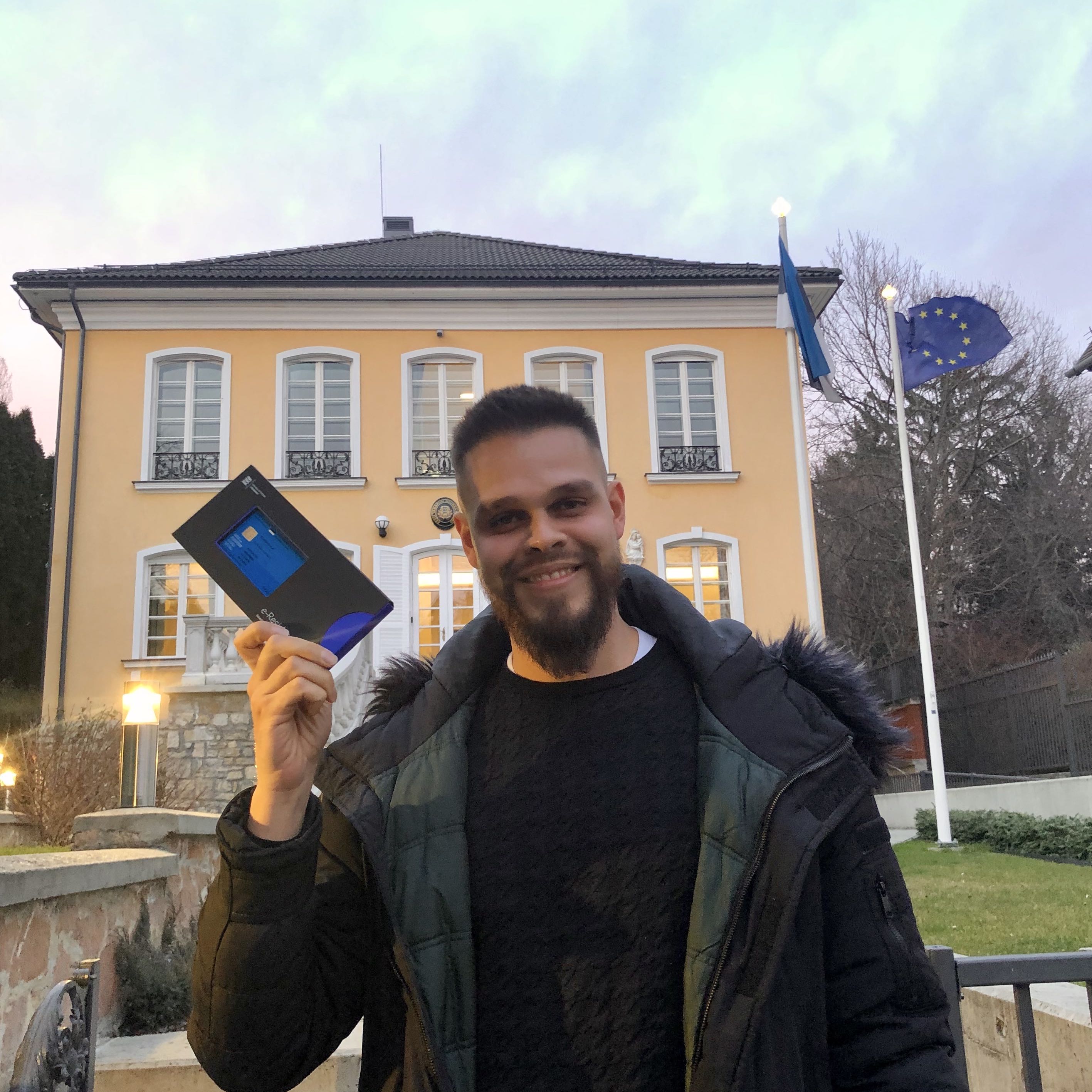
The e-residency Kit includes a residency card (without profile picture) and a USB-card-reader. With it, I'll be able to sign electronically and access any of the services available
The experience was eye-opening, and this although I was very aware that giving my digital prints and receiving my e-residency card would be the first and last time I'd need to visit any Estonian government building, physically.
To better understand my excitement and motivations, you first need to know that this 2020 is the 17th anniversary of my arrival to Europe. Also, that as of today, I still hold a Venezuelan passport, exclusively.
I left Venezuela in 2003, or better said, as soon as my age made it legally possible for me to migrate. Today, I'm a self-proclaimed "Citizen of the World" who lived, studied, and worked in Venezuela, Germany, France, Spain, Denmark, Malta, and Croatia, visiting an even more considerable amount of jurisdictions.
In short, you can consider me a Connoisseur of Bureaucracy, a Sommelier of Visas and Residencies, and a European Authority on the ancient art of requiring Stamps and Permits to earn a living.
With this in mind, picture my reaction as I learned there was a Schengen state of the European Union, allowing a Venezuelan to open a business online and in a few hours. First, I thought: "What am I missing?" and immediately after reading into it on their dedicated service portal, I knew: "I have to try it out!"
One needs to become accustomed to the digital state experience, even a Human-Computer interaction futurist like me. By the end of 2019, Estonia had 62,000 registered e-residents and 10,000 e-resident companies. I knew this, of course! Like I also knew that 99% of their state services are online, and regardless, although all the cards were on the table, it shocked me to learn about the Embassy's staff count and the efficiency of their operations.
Here is the workforce I was expecting to see at the Embassy to complete the process of my e-residency and interviewing the Consul: Entrance staff, service-desk Staff, e-residency processing staff, PR staff, the Consul's PA, and finally, the Consul.
The Staff I interacted with: The Consul.
And who opened the front door? You wonder. Who let you into the processing room? Who sat in front of you and typed on the Keyboard Gustavo?
Well, all doors are remote-controlled, that was easy. And like any other e-resident, I had an appointment previously confirmed via e-mail, so I was the only person in the room that day. The process took at most 3 minutes, a quick preview of the time I'll need for tax declarations. And the person guiding me throughout the steps, with a broad smile, processing my data, and assisting me in scanning my fingerprints was Kenneth, the Consul, as he pointed out me when I asked him about the agreed interview ahead.
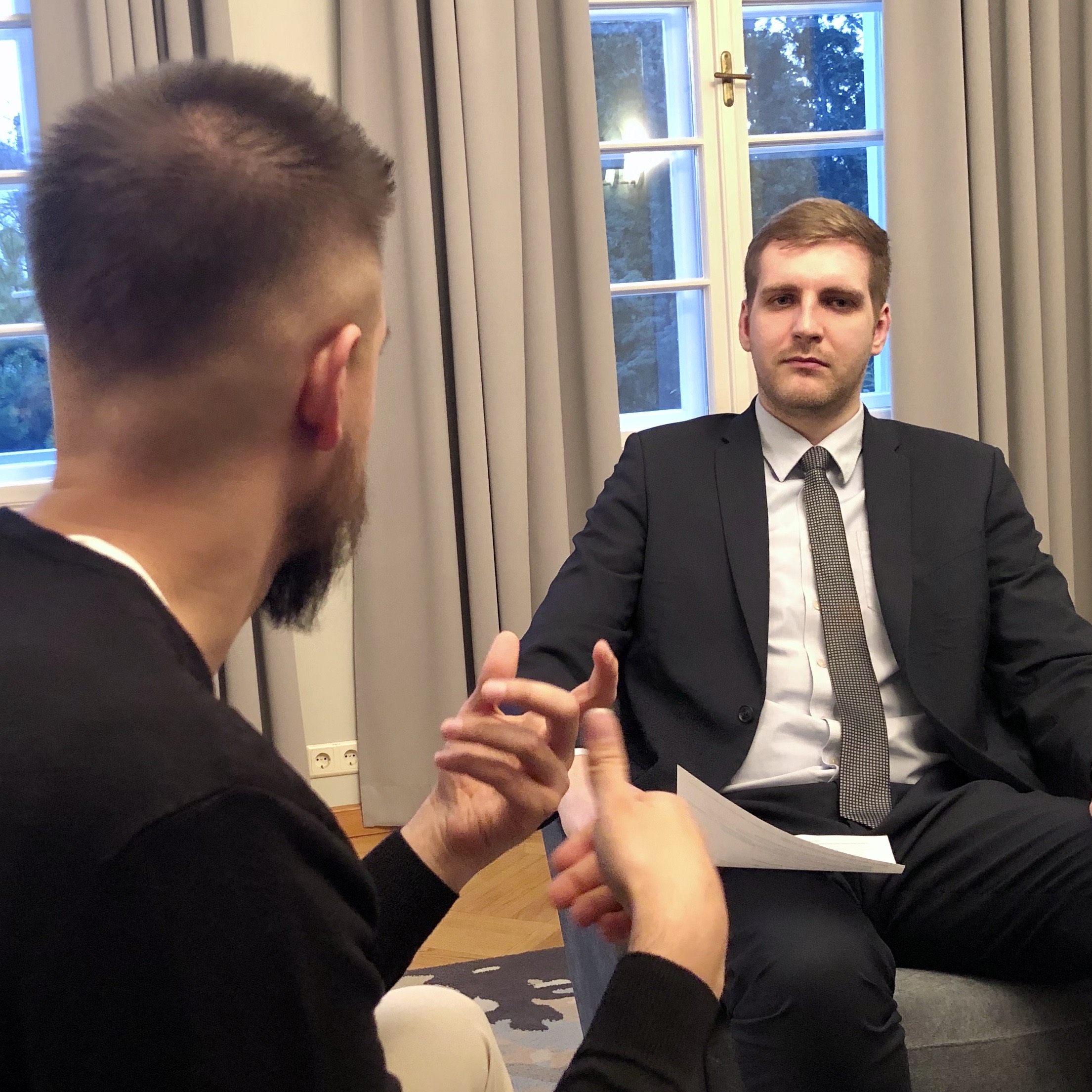
What an honour, I thought to myself, when I learned that Mr. Kenneth Kopammes and the Ambassador Mrs. Kristi Karelsohn operate the systems themselves. They welcome every visitor personally and hand over the e-residency kit to all new Estonian e-residents.
KK: "I tried to ask everyone what they will do with their e-residency and what their plans are. The vast majority want to open a business, and the other 1% are what we call "Estonian fans" or just people who would like to participate in something innovative."
Admittedly I belong to that 1%. The Estonian is the most advanced digital society I've come across, and there's much to learn from them. To run an embassy in such an efficient and human way, was unheard of to me, a real Country-as-a-Service. I don't recall feeling higher respect towards any other government official, as I did that day.
I recommend you reading Paul Bradbury's article on the "Rock Star" status the Croatian politicians enjoy: Would Croatia Be Better If Its Politicians Were Not Treated as Rock Stars?
Now, going back to the more practical reasons why I decided to open and run a company in Estonia while living in Croatia. The first and most important reason is the simplicity and transparency of their systems. By this, I mean the government and tax systems, not necessarily the ones in their computers. Without this, I certainly would not even consider it. I'm sure many of the other 60k e-residents share the same reason.
KK: "Last year, our Embassy gave out over 170 e-Residency cards, the vast majority of which to applicants from Hungary and the Western-Balkan countries. As our Embassy reopened at the end of 2018, many Croatian applicants received their e-Residency cards from other neighboring Estonian Embassies. People from Croatia interested in e-Residency are very much welcome to receive their cards from our Embassy in the future."
My second reason is TO LEARN. I can read websites and watch YouTube videos, or I can try it out for myself, experience it, and participate by promoting what works. In short, I wish to gather as much experience as I can, aiming to help pave the way for the imminent e-Balkan revolution.
KK: "The Embassy tries to engage with our existing local e-Residents actively. For example, last November, we had two excellent events dedicated to the fifth anniversary of the e-Residency program."
For more info about the community aspect of e-Residency, follow the links below:
Blog.
And the third reason is mobility. I'm a Self-proclaimed "Citizen of the world" and nomad (before the "digital-" prefix was a thing), remember?
KK: "One of the things that the system does not yet allow is to get married online. It affected me, personally, since I decided to marry my now wife after we moved here a year ago. To do that, we had to go back to Estonia three times!. Marriage is one of the few things that are not yet online, but it's in the works!"
All information is available in simple and understandable English online, and I feel convinced that it is always up to date. Most foreigners need to jump through hops and fire rings to get any document sorted in Croatia. Opening a company is not nearly as easy as advertised, and it is much worse to run it.
In Croatia, I can rarely rely on any information given to me, be it online or in person. The information changes from person to person, and from office to office. The time of the day you ask, your appearance and looks, who their "Kum" is, and your ability to seem "simpatićno" are all potential influencing factors during the process. In the best cases, a Croatian government official will admit not to have the slightest clue (or interest) by asking you to "send an e-mail with your question" while you stand in front of them. The fact that 4M people need to invest hours, if not days (thanks to the very centralized systems) in getting to their offices for stamps and papers, seems to be insignificant to the Croatian state. #TrueStory
I'm so used to having to bring a Croatian defender (lawyer, or anyone wearing a suit and speaking the tongue) to assist me in getting things done, that I don't even bother in translating and reading the information I receive any more. It's more relevant to know how many friends my lawyer/representative has in MUP, Porezna Uprava, and Courts than actually understanding the principles and rules.
"But Gustavo, what if you learn Croatian!?" Yes, I hear you, I could, and I am learning Hrvatski out of pleasure. However, when it comes to my financial security and independence, I prefer to run a business online, in simple English, and without any geographical limitation. Time is Money, and time invested in enjoying my digital-nomad-family lifestyle, as opposed to trying to figure out the system and the emotional state of the many actors influencing it, is priceless.
As I wrote at the start, there's so much to say about Estonia. So much to learn, try, compare, and analyze that I've decided to start a series of articles dedicated to it.
And based on the large attendance to HUP's event last February 5th, 2020, "D1G174LN4 (R)EVOLUCIJA" celebrated in Lauba, Zagreb (image below) I'm sure we will be talking a lot about this topic this and the coming years.
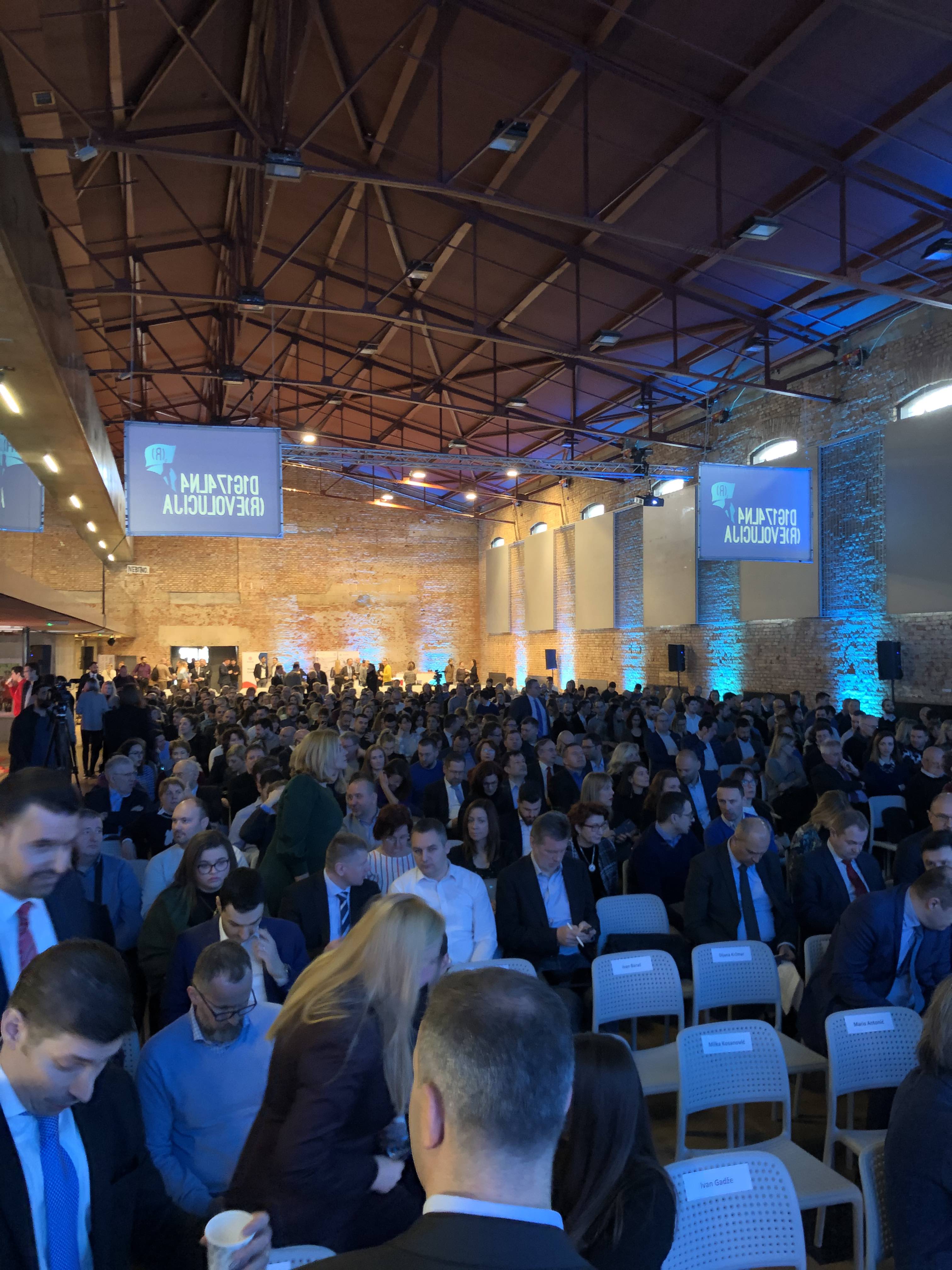
Last January, Estonia passed a bill allowing digital nomads (or remote workers) to come to Estonia and work from there. Could that be something Croatia can replicate soon? Read more into the topic of Digital nomads in Paul's article:
"How Croatia is Becoming Increasingly Attractive for the Digital Nomad Lifestyle"
Digital Estonia Leads, Serbian Tax Breaks: Meanwhile, in Croatia...
October 9, 2019 - As Estonia leads the digital revolution in Europe, Serbia announces tax breaks to entice digital nomads. Meanwhile in Croatia...
There are so many things I love about living in Croatia - the people, the nature, the climate, the food, the wine, the safety, the cheap pints.
And the total absurdity. I genuinely couldn't live anywhere else.
Here we are, fairly well into the 21st century in the rest of Europe, or at least most countries are.
Somewhere up there in northern Europe, a tiny former Soviet republic with no obvious natural resources to turn it into an economic powerhouse, little Estonia leads the way in its digital revolution. Now offering public administration efficiencies we can only dream of in Croatia, those efficiencies have also brought savings equivalent to 2% of GDP. Learn more in Lessons from Estonia: Farewell Uhljebistan, Welcome to the Future?
Could it happen in Croatia? At least a little bit?
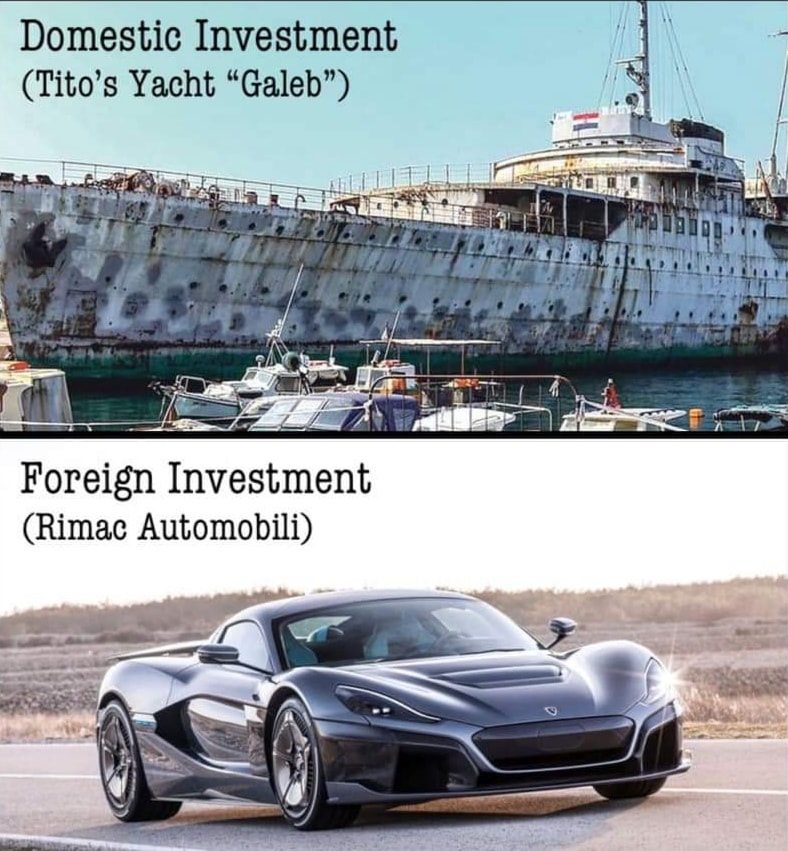
I had to laugh today when I saw this on a friend's Facebook timeline, as it just about sums it up. Rimac the superstar, a Croatian company which is taking the world by storm, attracting prestigious foreign investment form the likes of Porsche and Hyundai. Rimac Automobili, one small company started by a 23-year-old which represents the entire car industry of Croatia and which has the world's top names from abroad queueing up to invest. And the Croatian government, propping up things from the past - shipyards, a national airline (here is what happened in Budapest when Malev went bust 7 years ago) and a rusting boat of a former president from a former era.
But if they do insist on such things, could we at least be a little sensible looking to the future in working to attract investment by making laws and taxation competitive?
One area where Croatia has HUGE potential to attract an entirely new industry which could bring more visitors than tourism does currently (and for longer, not only in peak season, and not only on the coast) is the digital nomad revolution. To be clear - as there is some confusion - when talking about digital nomads, I am not referring just to bloggers and influencers (although they are a form of nomad), but people who work remotely online, and who can therefore be anywhere.
People like the Russian/Ukranian couple resident in Munich, but living all over Europe for 10 months of the year. From April to June inclusive, they were enjoying life in Jelsa (and they will return for three months next year). Their daily routine: swim, coffee on the square (Jelsa), work online until lunch (Munich), lunch in a restaurant in Jelsa, back to work online in Munich. After work, another swim and an evening's entertainment in Jelsa.
Working and earning in Munich, spending in Jelsa. 90 days a year.
Not in peak season.
Learn more about How Croatia is Becoming Increasingly Attractive for the Digital Nomad Lifestyle.
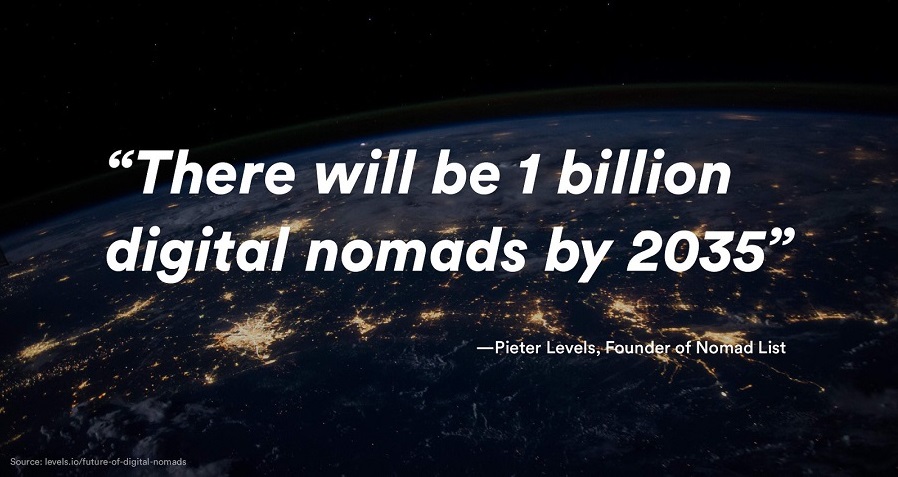
Blessed with its climate, lifestyle, location, safeness and a host of other things, Croatia really doesn't have to work too hard to make it a European hot spot for the remote worker of the future. Imagine that nomad couple in Jelsa multiplied by 20 million over the year and all over the country. Just 2% of that projected one billion. Is there anywhere better than Croatia potentially for a digital nomad lifestyle?
A little digitalisation, some third-country visa issues, making the residential permit nightmare simpler, that kind of thing. Really not difficult. Oh, and perhaps a tax break or two, some incentives to give nomads additional reasons to come and spend time and money in Croatia.
Something like Serbia announced today, for example:
A new demographic which Serbia is now looking to attract is digital nomads. The Prime Minister announced that starting in 2020 the Serbian government will be rolling out a new tax incentive. This first iteration will offer digital nomads a zero tax rate for income earned while working in Serbia (for a set amount of time – 90 days).
This announcement is quite exciting as part of a larger trend of governments beginning to acknowledge the importance of creating policies and incentive for remote workers and digital nomads.
Read more on Serbia's progressive approach to attracting the next generation of traveller.
Meanwhile in Croatia...
Despite the best efforts of the powers that be, Croatia is still a fabulous (and increasingly popular) digital nomad destination - check out the Total Croatia digital nomad guide here. But it could easily be SOOOO much better and a market leader in Europe.
But then I would not be living in Absurdistan and I wouldn't like it...
If you are a digital nomad in Croatia and would like to be featured, contact us on This email address is being protected from spambots. You need JavaScript enabled to view it.
A Guide for Digital Nomads - Especially Women - in Croatia
August 15, 2019 - A comprehensive digital nomad guide for Croatia, with a special emphasis for female digital nomads, as Tanja J. Polegubic joins the TCN team.
We are delighted to welcome Tanja to the TCN team. One of the pioneers of the digital nomad revolution in Croatia, Tanja's first piece is an exhaustive guide of everything you need to know about the digital nomad scene in Croatia, from every conceivable angle, and with an emphasis on information for female nomads. She has also written an ebook which you can download at the end of the article. Welcome, Number 138! If you would like to write about the Croatia, Montenegro or Slovenia where you are, contact us on This email address is being protected from spambots. You need JavaScript enabled to view it.. And now, over to Tanja...
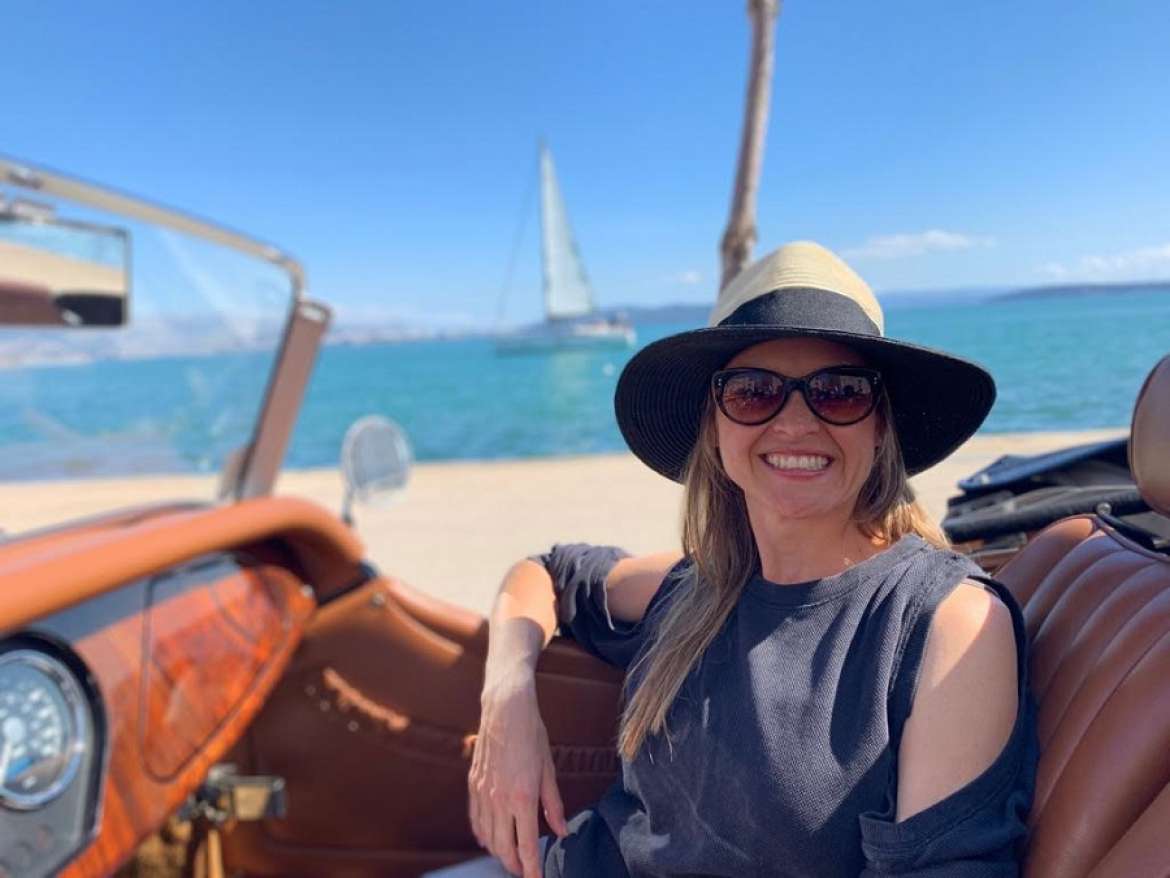
The 4 Hour Work Week, Pamela Slim’s Escape From Cubicle Nation, Eat Pray Love. Titles like these were novel on release, what with their promise of hammocks and laptops, starting side hustles and bouncing from Rome to Bali as a modern woman ‘finding’ herself. Now, these themes are all mainstream and have empowered a wave of remote working and living the digital nomad lifestyle - especially for women, and increasingly in Croatia. Add smart devices, cloud storage, unlimited data, online rentals of, well, everything from rooms to electric bikes to an address. The last decade has given us all the tools needed to be a digital nomad. Especially now in Croatia, which may have been unimaginable 10 years ago. I had certainly never considered it as a place to live and work. Things have changed, and are changing. As reported in TCN, the humble digital nomad can bring many benefits to Croatia.
And the way things are going, there’ll be 1 billion of us digital nomads by 2035.
With this growing wave, and the magnificent option of nomading in Croatia, here’s a 4 part guide on what to expect as a female digital nomad in Croatia, focused on Split specifically. Guys, it applies to you too - in most parts. As a coworking space owner in Split, I meet women who choose this country for many of the same reasons. Safety. Location. Mediterranean mindset. You can see my story and the stories of Chris, Gillian, Christi, Barb, Julie and Nicole, women all living the digital nomad lifestyle full or part-time, as featured on TCN.
If you’re looking to nomad on Croatia’s coast, this guide is for you. We’ll cover:
- WORK
- CROATIA for DIGITAL NOMADS: Why, What, When, Where.Etc.
- COSTS
- GETTING PERSONAL: Dating, Friendships and Finding Yourself.
WORK: Being a Digital Nomad.
First, establishing what kind of digital nomad you are (or want to be) helps you see yourself in Croatia. There are 5 main types:
- An employee.
- A consultant or freelancer.
- An entrepreneur.
- In Transition: Finding your path, a new side-hustle or change of scenery.
- The ModernSabbatical.
THE EMPLOYEE
The Digital Nomad Trend is On Your Side
If you’re an employee, convincing your employer to let you work from somewhere else is easier than ever, and hopefully the norm in the next few years. All the more, to choose Croatia as a nomad destination. (See Part 2).
“Life Leave”
More companies realise letting their teams work remotely helps retain staff and looks good to new recruits. Ernst & Young in Australia now offers 3 months of “Life Leave”. If you’re at a career crossroads, are uninspired by your colleagues, or find 10 vacation days per year (US) isn’t enough. Or, the ‘same ole’ is making you miserable - but can’t up and quit just yet, it’s time to get your digital nomad shoes on.
Working in a new environment, with the bonus of incidental travel, is now a reality for millions of digital nomads. No more waiting and saving. No credit card debt waiting for you. Freedom.
Before you take the leap, know the Digital Nomad lifestyle isn’t for everyone. Women especially may experience some issues - from the confidence to go out solo, to the choice being supported by family, partners, clients, managers and colleagues. The good news is, Croatia has many benefits. The high level of safety, English speakers (locals and expats) and internet speed means you can be productive, make friends and feel at home in a beautiful country. You’re joining a growing number of digital nomads arriving daily. Here’s some tips if you’re looking to make the leap and need help how to go about it.
TIPS:
- Suggest a short term trial first. This works for both sides. You’ll see if the lifestyle suits you. Your employer will know it’s not necessarily permanent and hopefully be more open to it. Especially if you’re the first in your office to ‘go nomad’ on the team.
- Use a project management tool. Perfect for remote teams. We like Trello.
- Consider the timezone. Pick locations where the timezone works for calls and meetings. Being on a call at midnight, and then again at 8am, can be hard to keep up. Set boundaries and communicate them in advance, or adjust things as needed.
- Find a workspace. Show you will have a reliable internet connection and productive setting around other professionals. This one is highly recommended, not only as a coworking space owner, but as someone who would rather paint my nails and do the washing when at home than get to some overdue admin. You feeling me?
- Use a lifestyle service. A what? Think of it as a hybrid of a travel and real estate agent and friend-of-a-friend in a faraway city. There are companies serving women travellers who work and travel as they go. They help with everything from finding accommodation to a yoga studio, to people on the ground you can meet. Coworking space members are also a great source of connecting. Reach out to us at Saltwater and ask about events, accommodation, the best brunch spots and our community.
- Mention other benefits. Do you do business in Europe and benefit being closer to these cities? Can you attend conferences or training in the region - while still getting work done? Find as many perks as you can. And ask for the coworking desk to be paid for at the company’s cost - always negotiate UP! A challenge many women find - and thus never even ask. Seek out a friend or book an online negotiation coach to help you put forward your case if this is not one of your strong points.
- Find a digital nomad buddy. Convince a friend to join you, or post online to see who else is travelling around the area you are interested in. Note - avoid committing to the long haul until you’ve met and tried out at least a few days together. Applies to strangers and friends.
CONSULTANTS and FREELANCERS
Well, you’ve got it made, haven’t you? Off you go.
For those aspiring to enter this style of working, there’s plenty of resources out there. Find a good podcast, coach or invest in something like Seth Godin’s online freelancer course. Find a mentor in your desired field, and see how they did it. Once you’re in motion, also try these:
TIPS:
- Offer your services online. Build an online presence and list on freelancer websites or through coworking space communities you join and even local collaborations.
- Inform clients you’re on the move. Arrange to shift any face-to-face meetings to video calls, instant messaging, and also advise them the timezone you’re on. It’s good to add this to your email signature, or social media updates and bio information.
- Work out payments in advance. If you’re charging in a different currency, fees and transfer times should be taken into account. Also research the tax implications of being abroad and any visa requirements if taking up local work. Croatia does not as
yet offer Revolut or N26, but services like TransferWise are handy for payments. For visas and other information about staying in Croatia, review the information on TCN.
ENTREPRENEURS
Again, as your own boss, it’s an easy one as you’re the one in control of when and where you go. Still, leaving your local base and managing in-person activity is harder from the other side of the world. How much you can keep operating depends on your type of business and who you have to rely on back ‘home’. If you’re shipping products, or run a hospitality business, who is there if things go wrong? How will you monitor progress? What do you need to have authorised while away? You may need an online video monitoring system if you have physical premises. Even if it’s just your personal property, there are many inexpensive and advanced systems which offer HD video, alert replays and an intercom.
Maintaining your business. TIPS:
- Build a support network. If you’re a solo operator, get a pool of friends, colleagues, or even recruit someone and give them a run-down of operations before you go.
- Inform suppliers and clients you’re on the move. And let them know who to contact or how to contact you while away.
- Prepare for business transactions and calls while abroad. Have you got SMS authorisation for your banking (and will be changing your SIM card over)? Will you need to renew a contract while away? Can you divert a phone number to a virtual answering service? Check any expiry dates on cards and permits, ensure someone will open your mail. Anything which blocks a bank account or new business can be anticipated. A local phone number service such as Local Phone is handy when internet drops out during a call - or your bank has a landline you may need to call. This has saved me while making online transfers or a blocked card issue.
Looking to start or expand your business - in Croatia.
“Those who do not use local guides cannot take advantage of the ground”. Sun Tzu
The value a reputable, well-established, connected local (or expat) can bring you in Croatia is immeasurable. This place is very much “who you know” and many have jumped hoops and wielded machetes through the paper jungle ahead of you. Find them. And if you’re used to a North American, Western European or Down Under way of doing things… buckle up!
TIPS:
- Attend networking events or join a coworking space. This is a great way to get a read of the territory by speaking to people already operating in the area. Many business owners will happily share their grievances, what’s worked and what hasn’t. Further, you will find it easier to connect to someone in your chosen industry. Face to face goes a long way.
- Make friends with locals and established expats. Remember to give, as well as take here. If all you’re doing is asking, or needing a lot of help - this can wear thin. In this case, hire a professional to provide these services or offer to barter your skills.
- Offer an exchange. If you can mentor or add value to a business, you can continue working (noting local employment laws) and benefit the local community, while learning new skills and building on your body of work.
- Speak at or host an event. There’s a bunch of meetup groups, everything from fitness and meditation, to business networking. Contacting the hosts and offering your services will likely be very welcome. Events are usually free and a lot of work on top of regular business, so if you can prove you’re capable of delivering - you’ll be a welcome addition to the local business sector, and readily accepted as you’ve “given” rather than just “taken” information. You’re not the first new arrival with the groundbreaking idea of how to make things better here. Skin in the game goes far.
- Do your research. If you’ve got a particular industry in mind, ask around. Try things out. Croatia doesn’t have a lot of information online about.. most things. And what it does, tends not to be in English. A reputable local contact and online english language portal like TCN are invaluable when getting a grasp of things.
Most of all, be discerning. Be wary of who you do business with. Be patient and persistent.
TRANSITIONAL
One of my favourites. You’re finding your path, a new side-hustle or change of scenery. You could still be any of the above, but it’s a restlessness which nomading can help cure. If there even is a cure to this modern form of The Travel Bug. The Mediterranean is a great place for it. The pace puts the brakes on the fast treadmill setting you’ve likely been on. Coffees are slow and social. No more rushed cups by yourself staring at the screen. (Yes, it’s still cool to take coffee at your screen sometimes).
Observing the local ‘slowcoast’ lifestyle, while frustrating at times, teaches you a lot. Being among a mix of affluent European holidaymakers (think superyachts) while next to people collecting plastic bottles for half a kuna, makes you reassess things even more - and your place in the world. Perfect for anyone in the “finding yourself” phase. You’ll value things you’ve left behind while also appreciating simplicity and even the struggle of where you are. It inspires you to find a happy middle ground to best match the opportunities to enjoy the place you’re in - a young country still healing and even rehashing old wounds, battling everything from corruption to a brain drain, to mental health stigma and unaddressed PTSD. All while trying to assert its identity and being part of the EU.
If you’re looking for a change in where you’re going, this is a great place to reset and reevaluate. Epiphanies usually arrive during sundowners somewhere. Croatia mixes the sophistication of Europe, with a very relaxed seaside setting. Draw from those what you will.
TIPS:
- Connect. Find other digital nomads. You’ll likely find, “it’s not just you” feeling the way you’re feeling. Hurrah! Far from home, wondering where you’re going or where you’ll return to. Read the stories of Chris, Gillian, Christi, Barb and Nicole for inspiration. Women just like this are around all the time. Our workspace is great if you’re looking to meet people and need a friend.
- Step outside the comfort zone. This is the point, right? No one sees the layers you’re perceived to be wearing back home. Nobody knows you here. Try new (safe and legal) things. Ask someone out to dinner. Sunbathe topless. Learn to sail. Etc.
- Work out your ‘Why’. Easier said than done, but again, plenty of resources. Try Simon Sinek. Pamela Slim’s Body Of Work. Jen Sincero’s Badass series. Marie Forleo. Pema Chodron (WOAH!). Get a coach, especially one in the EU, the likes of Anna Anderson and Ginny Krauss, who are part of the Saltwater family and have been part of the transition and empowerment of our members.
THE MODERN SABBATICAL
A Break From the 9-5.
You’re finally writing your book. Your kids have moved out. You’re newly single. You’ve got a personal interest website to build. You’ve got a dream to follow. Etc… but it would be great to also make money while doing it.
Being a digital nomad, especially at 30 plus, allows space for over-neglected passion projects. Taking advantage of the gig economy, it’s easy now to build your own team of remote freelancers to build a website, get a publishing coach such as Jodi Brandon Editorial, or any other niche skills you need to bring your idea to life.
Rather than waiting for the right time, saving, or returning ‘home’ to credit card debt, working along the way helps you follow a dream, and perhaps even reveal the unexpected. All while keeping finances replenished along the way.
TIPS:
- Rent out your place. Many home-owning nomads rent out their homes as an additional source of income while away.
- Find paid gigs by asking your network. Tell people you know you’re looking for any paid gigs. You’d be surprised what skills and small, but paid tasks are needed by busy people. Are you a spreadsheet whiz? Love words? A hobby photographer? Basic photo editing using affordable software is in demand from professional photographers on multi-day shoots. Explore forums to see what people are asking for, and put yourself out there. Start low, and build up a body of work to get more streams of income - a trend we all need to go, and something the Dalmatians do well!
- Get a seasonal job. This can be your ticket to staying in Croatia through a work permit. 3 months working and living on a vineyard can buy you time in the region if you’re not an EU national. And goodness knows our smallholder farmers need it.
Workers in demand in Croatia, on the coast in particular, include:
- Hospitality &Tourism.
- Agriculture. Vineyards, olives and other Mediterranean produce duringharvests.
- Construction (usually outside of thesummer).
While the pay will be lower than you’re used to, (construction aside), the skills shortage could be the ticket to a work residency permit to allow you to stay in Europe. It’s valid for 12 months, and most of this work is seasonal, meaning it’s only a few months and can help you cover some costs, gain new skills and perspectives, and keep up the digital nomad work.
Negotiate for accommodation or meals where you can, and honour your passion to boot!
CROATIA for DIGITAL NOMADS
WHY CROATIA:
Top 10 Reasons for nomads (especially women):
- It’s safe.
- High English speaking population.
- Fast internet and good mobile coverage.
- A growing digital nomad and expat community.
- Natural beauty: mountains, sea, islands, national parks.
- Active: hiking, climbing, sailing, free diving, sea kayaking, sports.
- Cultural and historic treasures: Early Stone and Bronze Ages, Roman, Byzantine, Ottoman, Venetian and Austro-Habsburg eras.
- Strong cafe culture. Taking 5 … that’s up to 5 hours, for a coffee, is the norm.
- Gastronomy. A range of Mediterranean and regional delicacies such as olive oil, truffles, seafood with influences from the entire region for abroad experience.
- Wine. Craft Beers. And other spirits, including rakija (herb and fruit) and award-winning gins made from the local botanicals.
GETTING AROUND:
Croatia is easy to get around. Most cities are connected by new highways with regular buses. The islands are all within an hour or so ferry ride from the mainland or each other - unlike our closest Mediterranean equivalent, Greece, which will take you half a day. Island hopping really is a breeze, here. There are also regular flights to many European destinations, with more carriers in the summer period. Rideshares are also gaining popularity and taking the sea-route, rather than land is a wonderful way to travel.
WHERE TO WORK AS A DIGITAL NOMAD IN CROATIA:
Coworking spaces.
Clearly the winner. Reliable internet. Privacy and professionalism for calls and video conferencing. A community and a bunch of regulars to collaborate, soundboard, travel and dine with.
Cafes.
Convenient for short periods. Note, if you’re solo, you’re taking up room of paying customers and in high season, is frowned upon. In cooler months, this is more accepted, but if you’re a non-smoker, the enclosed cafe environment will have you surrounded by more ashtrays than digital nomads.
Your Accommodation.
Most accommodation rentals will have wifi and air conditioning. A desk setup may not always be available, but the dining table or a balcony if you’re lucky is ideal. Could be a little lonely… so breaking up the work-from-home by getting out is an investment.
Libraries.
Most cities have a local library. Probably dwindling in popularity, these spaces also host local speaking events and presentations (usually in Croatian).
Co-Living Spaces and Hubs.
Coming to the Croatian coast in March 2020. Stay tuned to TCN for locations.
WHAT TO DO:
Food + Wine
The #1 ranked Mediterranean Diet is all around you. Try local made wine, seafood and regional specialties. Either served to you, or part of catching and preparing the meals.
Active + Nature
Sailing, Hiking, Cycling, Swimming, Kayaking… you’re in a 200km radius of some pristine nature. This pristine status is also under threat. A clean up is
Festivals
Every city has a range of celebrations - mostly religious. There’s also a growing number of music and dance festivals.
Heritage
If you’re of Croatian descent (well over 4 million people from around the world are), explore your origins, family tree and the language.
History + Culture
Ancient and Roman settlements, Byzantine, Ottoman. Pick a date in history and go explore.
Islands
Look up a ferry timetable, find a local attraction or idyllic beach and get thee over to an island.
Wellbeing
Meditation, yoga, seasonal harvests… Here there’s also 4 hour lunches or 3 hour coffees. Om out, in nature or a slow coastal cafe.
Business
As a digital nomad, you likely wear many income-generating hats. Start or find business here. Note the local requirements to work here - and respect the locals who abide by local requirements, permits and associated taxes and high costs in running a business.
When to come?
JULY + AUGUST
This is peak season and you’ll pay the highest prices for everything during this time - except maybe budget flights. If you don’t mind the prices and lots of people, this period sees Split at its most bustling.
APRIL-MAY
The weather is warming up, places are reopening after being closed for the winter. This is an affordable time and the staff are full of energy.
SEP + OCT
School has restarted and the weather is gorgeous, Mediterranean harvests are underway - wine, olive oil and truffles. The perfect time to travel.
DECEMBER
A festive time with Advent celebrations with tolerable outdoors weather (bring a coat)!.
JAN, FEB, MAR, NOV
The quietest times on the coast. Most places close, there is less on offer and limited flight connections. It is however a great time to experience Croatia without any crowds.
COSTS
The average budget of digital nomads coming to our space is €2500 per month. This includes accommodation, coworking, meals (a mix of dining out and self-catering) and recreation.
Accommodation:
In Split, expect to pay approx €500 in the centre for a 45m2 apartment. Considerably more for short term.
Food + Entertainment €1500 per month
Dining out will cost 50 HRK for a vegan burrito to 250HRK for a fine dining experience. Self catering at the local markets is about 100 HRK for a full day of veg and certain types of seafood.
Coworking
We offer dedicated desks for €249 euro or €16 per day. Less for long term plans. In a cafe: A flat white is €3.
If you’re drinking 1 per hour in a working day to ‘buy’ your seat, it racks up to €24.
Get reliable wifi, ergonomic seating AND 2 coffees for that price. Coworking is a cost-effective option.
Travel
If you take the bus or ferry twice a week to see a new destination on day trips, expect to pay 60 euro per week. Cabs extra.
Adding an extra €1000 per month allows for indulgences such as retail therapy, 1-2 nights accommodation per week and other recreation.
TIME TO GET PERSONAL
Dating, Friendships and Finding Yourself.
DATING
I’m occasionally asked by nomads about dating locals in Dalmatia. Thankfully, destiny stepped in for me and I dodged the ‘dating-in-Dalmatia’ bullet. While no veteran, there are things I’ve observed as recurring themes specific to cultural differences.
- Lives with mum. Many unmarried, or even married Dalmatian men, still live at home. Even beyond age 50. It’s the same in Italy, where 60-year-old men still get their shirts ironed and pasta on the table daily. Loans are usually avoided at all costs - and to be fair, wages are low and moving out is not a financial option. Shared housing isn’t very common either, except for students and only during school terms. Be understanding. And get used to a mother-in-law who will worship your guy, especially if he’s the only son.
- Earnings. The wages here are among the lowest in the EU, so as a financially independent female, you just being you may be intimidating - or worse, a target. This is rarely the case, but one lady I know of was threatened to be sued for causing ‘emotional distress’ after not wanting to go on further dates.
- Different views. Attitudes on gender and sexuality will likely be more conservative than most digital nomads are used to. If your values differ on some fundamentals, it may be best to call for the bill.
- Divorce. As a very Catholic country, divorce was a last resort, but this, like everywhere else, has changed. A friend I have was ghosted, twice, after sharing her history.
- Making the First Move. Asking a guy out here is smart, as you may wait forever. Having said that, consider how long you’re here. These are small towns, you will probably run into the same person during your stay. Use your best “is he into me” judgement.
A special note about looking for love as a digital nomad.
Whether it’s Dalmatia, Northern Croatia or Chiang Mai - the growing number of digital nomads (with more screen than in-person interaction) makes forming bonds tough. Add in the prospect of finding a spark and then... you leave. If relationships weren’t tricky enough, being a nomad adds to the complexity. Understandably, anyone will be hesitant about getting their heart broken.
Nomads have chosen a lifestyle where mobility is key. Going for a local may cause disappointment - not only for them, but for you if you’re sacrificing your mobility overnight.
Consider also the numbers. Most working relationships come about through recommendations by friends, followed by the workplace, shared interests, then online.
PS I know a delightful circle of eligible men (and women) who are locals or regular nomads in Split. Another perk of using a coworking space - see point above about meeting at work and through a recommendation.
FRIENDSHIPS
As women, we tend to talk things through. Not having your bestie there in person can prove one of the hardest things when living the nomad life. It took me several years to realise the importance of the friends who knew my backstory, and it still impacts me not being able to fully express what I’m going through, especially when on the move. Video calls and instant messenger are a blessing, but there’s something about a person right in front of you.
As noted above - you’re usually not alone in your ‘digital nomad’ quandary, if you’re going through one. Reaching out to someone - hopefully empathetic - is a way to form bonds, and unburden yourself on what can be a lonely journey.
Knowing this, you can prepare ahead by doing things you know help such as journalling, lining up times to call and chat to your friends or a long walk and uplifting podcast.
Soundboarding about colleagues or a work project is also a bit harder, so processing these thoughts - a local therapist service or counsellor, is recommended. Whatever you do, reach out. You’ll find other nomads have experienced similar issues, and can help you through.
FINDING YOURSELF
This is where this guide ends, and your own answers come in.
Your reasons for being a digital nomad could be any number of things. Whatever they are, the hope for you is that they are fruitful, you find some other great nomads and experience along the way - and add Croatia to your nomad list. We’ll be here waiting for you at Saltwater, and the TCN resources will keep coming.
Happy nomading! And consider Croatia, especially in the off-season.
****
Tanja has written an excellent and very helpful ebook on being a digital nomad which is available here, and you can also visit the Saltwater Workspace website, her coworking space on the Split riva.
You can learn more about being a digital nomad in Croatia with the Total Croatia guide.
Are you a digital nomad in Croatia who would like to share your experiences, as these other nomads have done? Contact us on This email address is being protected from spambots. You need JavaScript enabled to view it.
A Digital Nomad Reflects on 63 Glorious Days in Croatia
July 22, 2019 - They are not tourists in the classic sense, but they do travel around and spend. A digital nomad reflects on 63 days in Croatia.
After 63 days in Croatia it is finally time to move on. We stayed at three different locations, all of them great in their own way, so I wanted to share the details for those that are interested in learning more. This country is so special with the amazing water, weather, and people and the food is some of the best I’ve found! Our next 45 day journey starts today, but here’s an overview of our stay here:
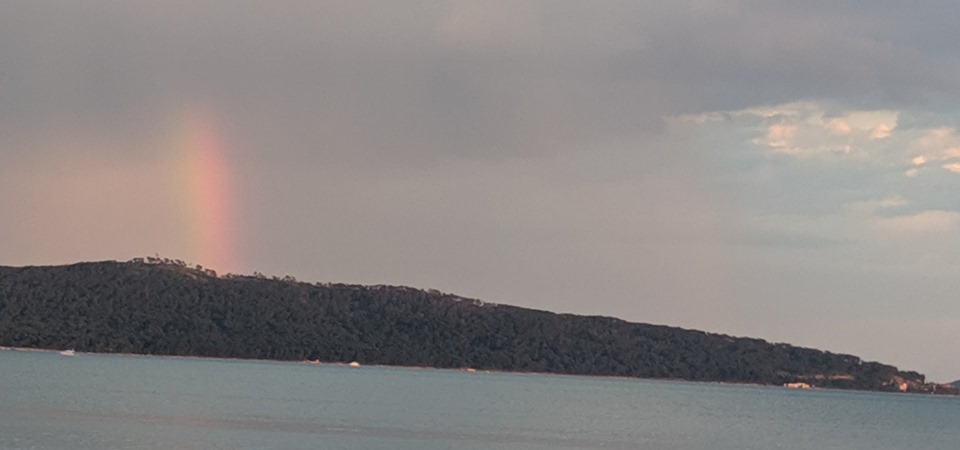
Leg #1: Kastel Kambelovac, just 20 minutes north of Split
We stayed in a very small one-bedroom unit with a direct view of the channel and a balcony that we ate on as often as possible. When we arrived May 15 it was a bit sleepy with not much activity and the weather was rainier and colder than usually, but within a few weeks it went from that to very hot, in the 90’s F. The energy of the city also changed come June, especially by June 15 which seemed to be the switch to summer. Within a few days people were everywhere, beaches were crowded, areas of the sea were roped off to delineate safe areas and the area became more bustling.
Split town, pretty easy to walk around when we arrived, also got busier and you could see more cruise boats all the time. When we first got here we weren’t that impressed, aside from the view and closeness of the water, but as we are now leaving we have become “part of the city” somewhat. We have conversations with restaurant people, some locals and I can see that over time it could grow on us. Learning the language, well, that’s another thing, as it is highly unlikely that we would learn Croatian beyond a few words. Very difficult and different than anything we were used to.
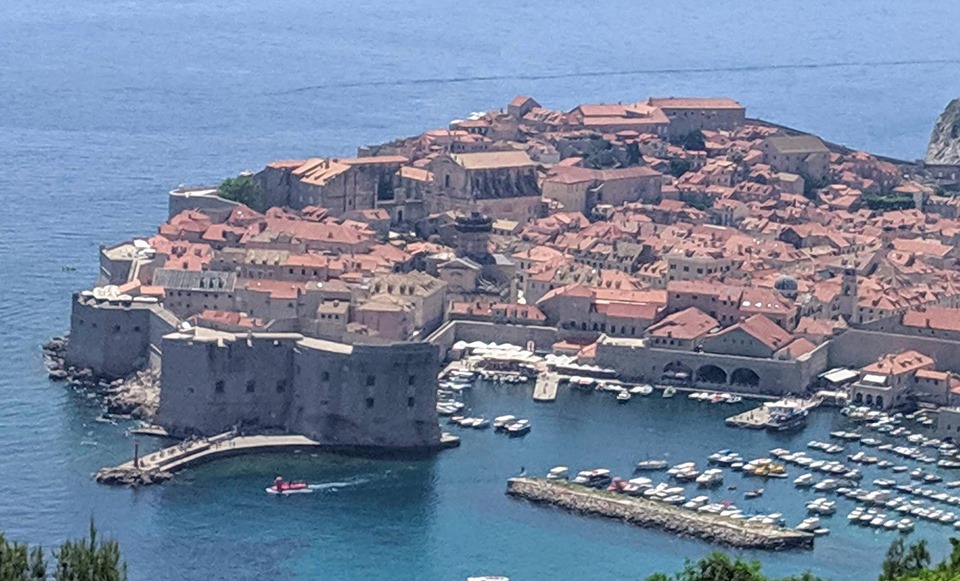
Leg #2: Dubrovnik, actually a small village called Plat just 10 minutes south
We were only there for a week and when we walked into our unit we flipped as the balcony expanded to an amazing pano view of the channel and sea from a very high distance above. The unit itself was small, but very clean, and aside from not have a complete kitchen, worked beautifully. We found an amazing restaurant 100 yards down the street and ate there several times for amazingly good prices considering what they charge in Dubrovnik proper. We liked Dubrovnik Old Town, but as warned, it was crazy busy and hot in summer. We found some great places to enjoy the water and the beauty of Croatia is that you merely have to take a ride along the coast, and when you see a place that looks good, you stop. Parking is never a problem and you can do it any way you can!
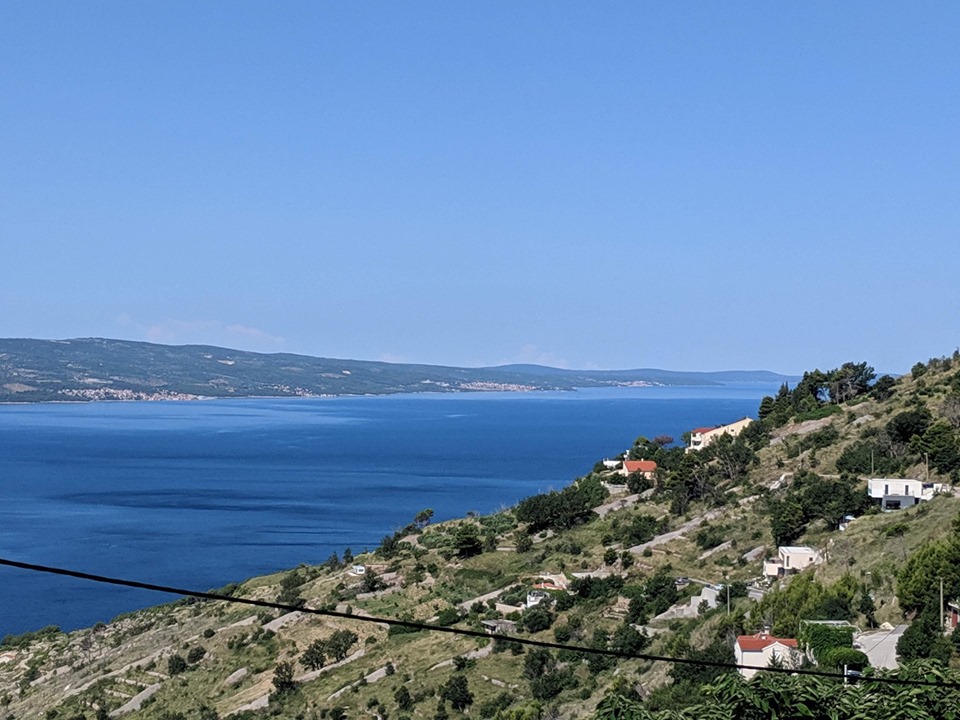
Leg #3, Lokva Rogoznica, a small village just south of Omis
This was the city whose name I could not pronounce, but loved immensely. As we rode into Omis the first time we, like everyone who does so, were amazed at the rock walls alongside the city. We were at this location for 10 days and this was a trip. The first time arriving we kept climbing up and up and up alongside the cliff wall. We finally get to this small village via several switchbacks and it looks deserted and empty. It mostly was but still enough people to create good energy and our unit was outstanding. We stayed with another couple for a novel experience, and each of us had two complete units with kitchens, baths, etc… Again, fantastic balcony very high up looking at the island of Brac. Several times rain arrived, we could see it doing so! And we watched lighting and heard thunder as though we were IN the storm. Pretty awesome.
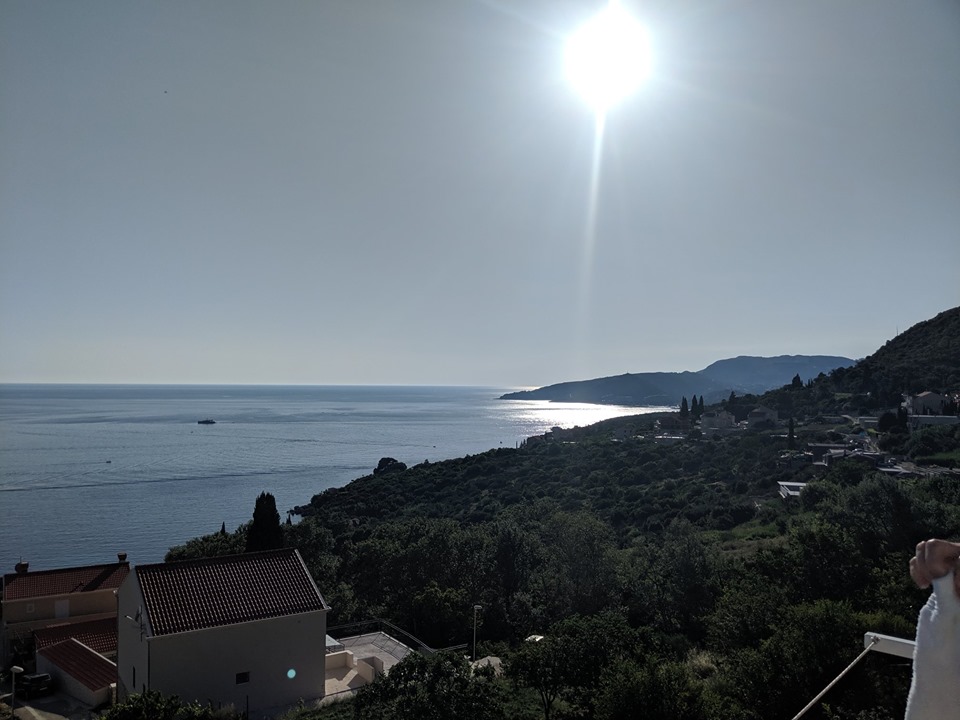
A car was required and we spent a lot of time at these beaches and in the town of Omis, plus did a great raft ride. We had a terrific guide and for about $35 spent 2.5 hours on the River Cetina. The only downside was my pixel phone was lost in the river (my bad) but otherwise, all good.
So, after 63 days the question is “Do we come back?” and the answer is a 1000% yes. Where, when are yet to be decided, but for anyone who lives or spends time in Croatia, you get it. For those that had no idea where it is, which included me just a year ago, get this destination on your vacation plan and bucket list. If you need help or suggestions on how to Travel Younger, just ask.
Norm Bour is a travel writer and blogger who teaches others how to “travel younger.” A Baby Boomer who permanently left the US in February 2019, Norm stays at different locations six weeks at a time, with no intention of stopping. He never traveled outside the US until 2016, but watched how the Millennials traveled affordably and with a great sense of adventure and fun. At age 64, he and his girlfriend decided to learn from those that were doing it right and is committed to inspiring Baby Boomers of any age to live their dream. Follow their journey at his Facebook blog under Travel Younger..
To learn more about the digital nomad opportunity in Croatia, check out the dedicated Total Croatia guide.
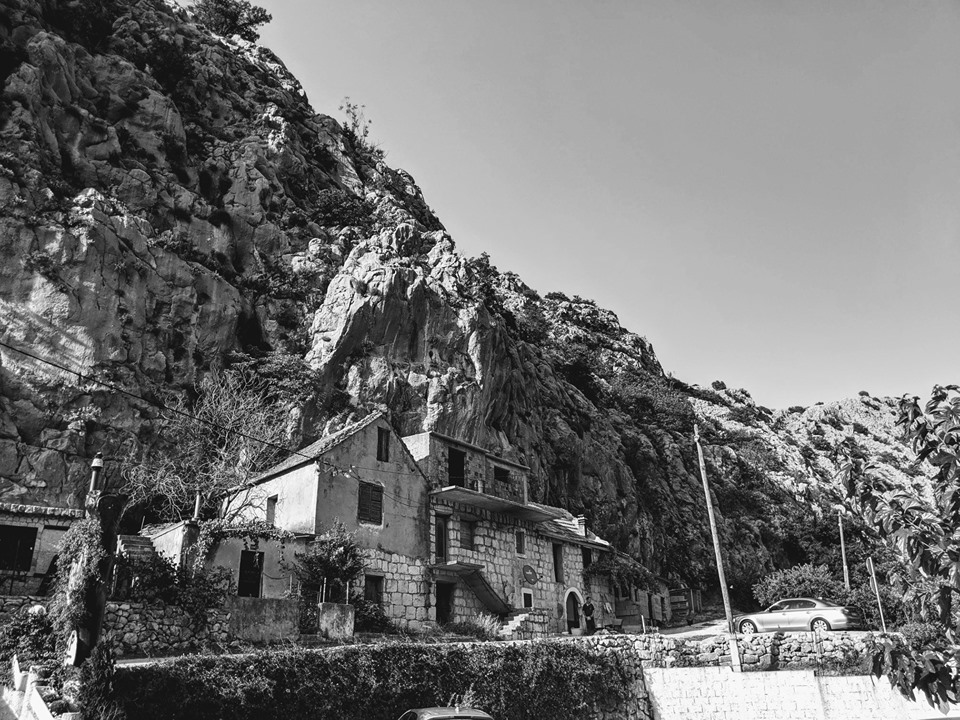
Digital Nomad Life in Croatia: Christi Lyn Rice, from Florida to Split
July 14, 2019 - As the number of digital nomads rises globally, some are choosing to spend some of their time in Croatia. A new TCN series meeting international digital nomads calling Croatia their temporary home. Meet Christi Lyn Rice from Florida.
As recently featured on TCN, the world is projected to have a billion digital nomads by 2035, people from all over the world doing all manner of jobs and business with one thing in common - a flexible, mobile workplace connected to the Internet. If even a fracture of that number becomes a reality, the economic opportunity for countries which can attract these wealth-generating individuals has the potential to dwarf Croatia's current tourism revenues. And there are few countries better placed than Croatia to take advantage. Safe, beautiful, great gourmet scene, top tourist destination, English widely spoken, well connected to other destinations, and a superb lifestyle.

In order to look at the issue in more detail, we have decided to look at some of the digital nomads who have Croatia in their lifestyle plan, and to find out why Croatia, what Croatia offers, and what are the things that countries should be looking out for to take advantage of this economic opportunity. I am very grateful to Tanja Polegubic from Split's waterfront co-working space, Saltwater in Split (see location below) for her help in connecting me to various digital nomads using her space.
Our next digital nomad in Croatia is Christi Lyn Rice, who spent time in Split away from her native Florida.
You are one of a growing number of digital nomads. Tell us briefly who you are and what you do.
I am the Grants Manager for the Broward Center for the Performing Arts in Fort Lauderdale, Florida. In this role I help secure private and public funding for general operations, capital projects and programming, which includes the largest free arts-in-education program in the United States. While most of the year I work out of our office in Fort Lauderdale and very much still consider that my home, I’m very fortunate that my organization has allowed me the opportunity to work remotely full-time during the summers – which in turn has given me the freedom to live in and experience some amazing places!
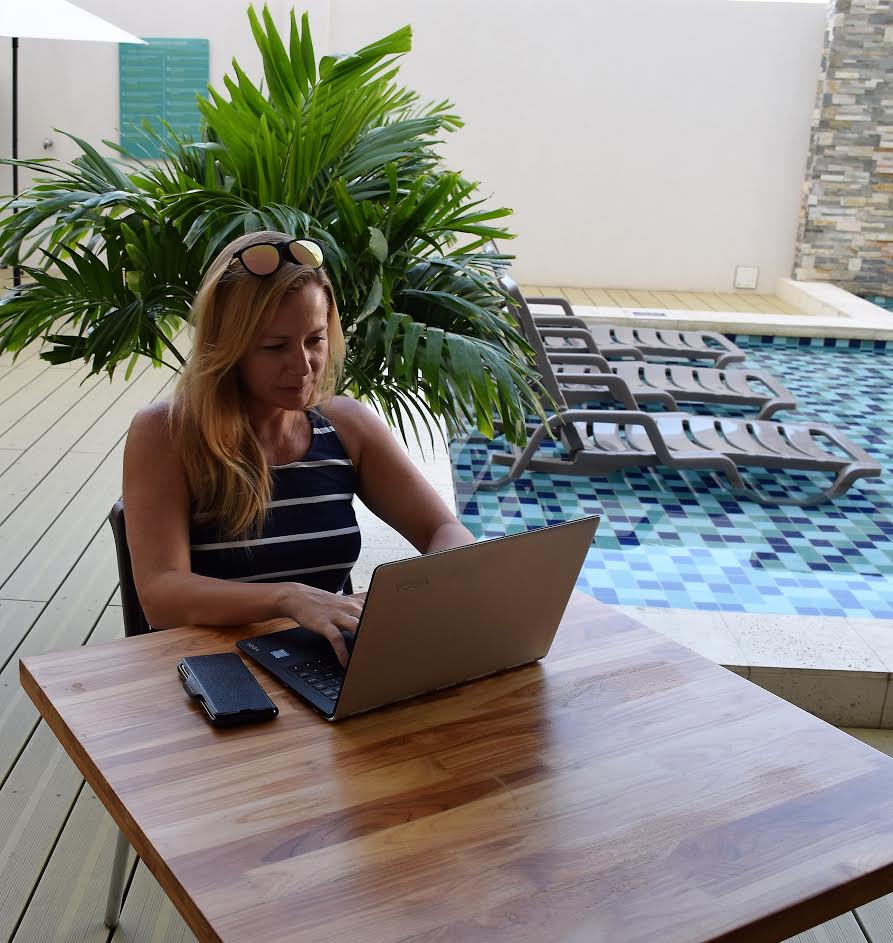
Working from your laptop rather than in an office seems like the dream lifestyle. What are the main pros and cons?
In addition to the flexibility to travel almost anywhere, I love working in a co-working space environment, where every day brings something new and I have the opportunity to meet people from all over the world in a wide variety of industries. Being surrounded by like-minded creative, innovative and self-motivated professionals is inspiring and helps me think outside of the box when it comes to my own work. I also find I’m more productive when working on my own schedule and can maintain better focus on projects when I have fewer meetings, events, phone calls and emails in real-time, given the 5- to 6-hour time difference. Living abroad in general has been an invaluable learning experience and really helped shape my perspective on what is and isn’t important in life.
As far as the challenges go, you have to be very self-motivated. It can be difficult trying to balance a full workload with the desire to explore an exciting new city, learn about a new culture and meet new people, while at the same time also trying to maintain a healthy lifestyle and not burn yourself out. Meaningful friendships can also be a challenge – meeting people while traveling is easy, but you have to get pretty good at saying goodbye. The biggest con for me, personally, is missing my dog, Lucy (although she is in great hands while I’m gone – thanks, Mom!)
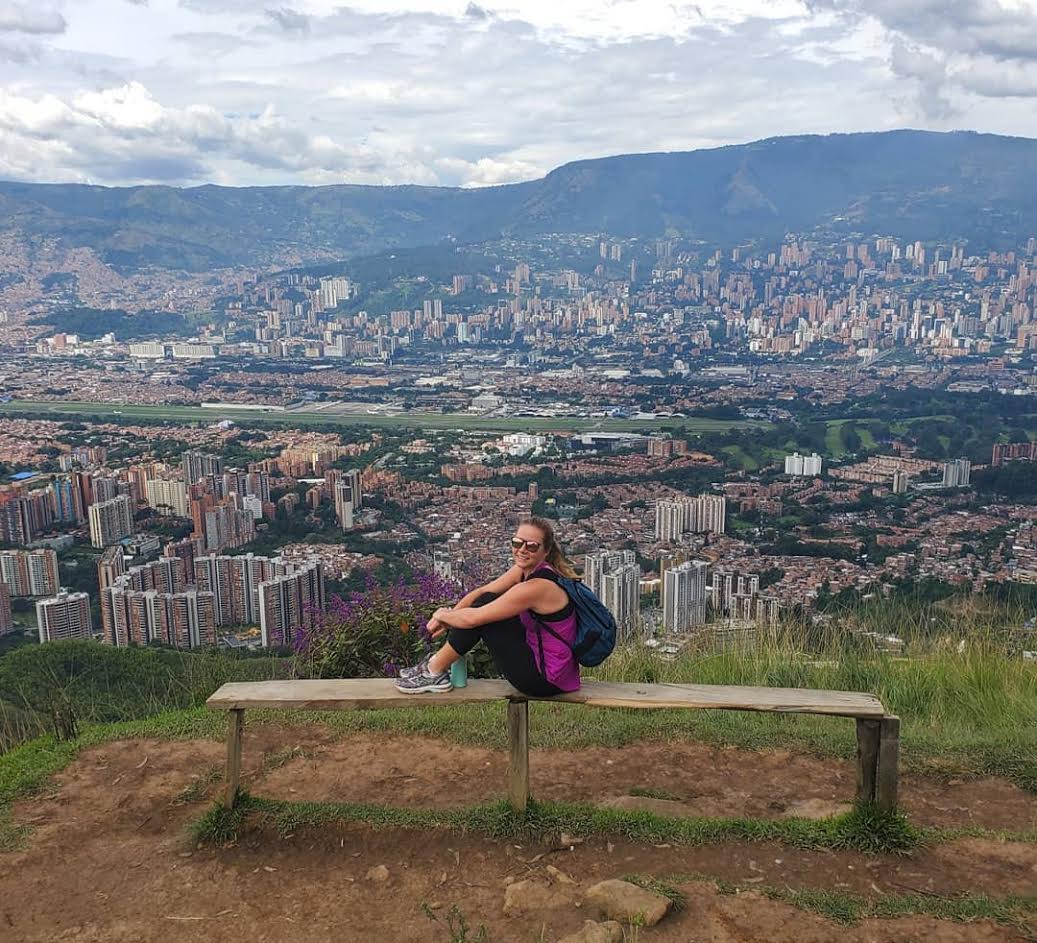
Laptop living gives you the freedom to travel and choose your place to live. Where are the global hot spots currently for digital nomads?
In addition to Split, I have lived in Lisbon, Barcelona and most recently Medellín, Colombia, all of which are definitely hot spots for digital nomads right now. Next up this summer are Tenerife, Budapest and then…?
You chose Croatia and specifically Split - why?
Split was the perfect home base for the month I spent in Croatia. It offers a unique balance of nature, nightlife, culture and great weather, is fairly compact and walkable and already has several established workspaces such as Saltwater Split (which was great not only for maintaining my productivity but for finding a sense of community.) I can’t think of many places where I would have the opportunity to work in a setting as unique as Diocletian’s Palace, go for a hike in a park as beautiful as Marjan or a swim at the beach and then enjoy great restaurants and nightlife, all in the same day. I was also lucky enough to be in Split during the 2018 World Cup, which was such an unforgettable experience and a special introduction to the spirit of Croatia. At the same time, Split was conveniently located so that I could easily travel to Dubrovnik, Hvar Island, Plitviče Lakes and others parts of Croatia on the weekends, and I was able to see a lot of amazingly beautiful places in a short amount of time.
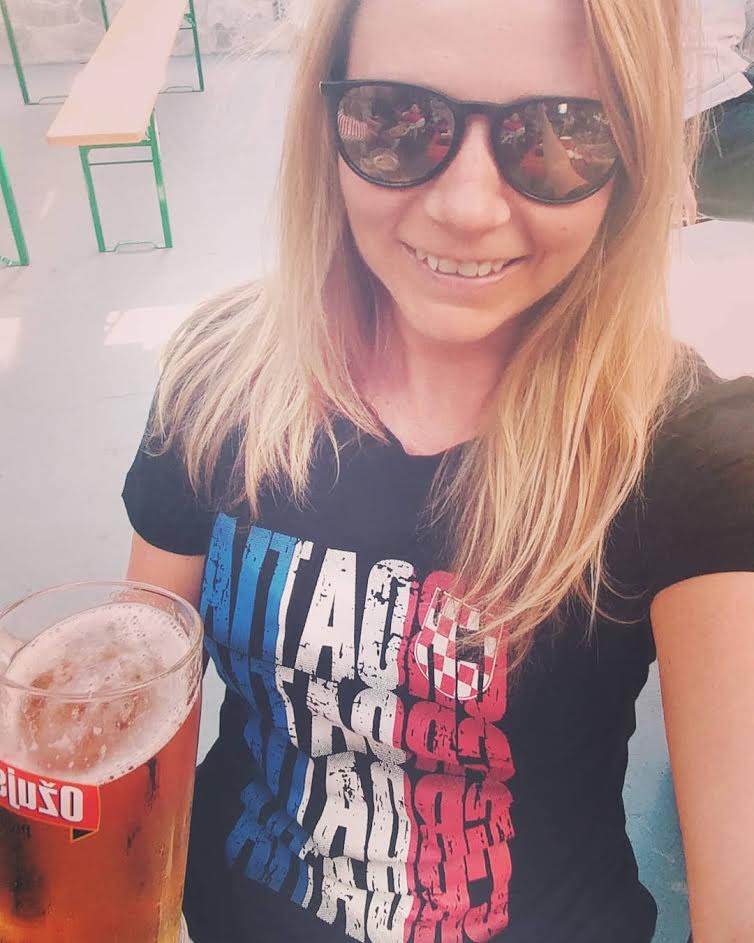
What are the most important things a destination should offer to be most compatible for the digital nomad lifestyle, apart from that all-important good WiFi?
Affordable short-term housing, walkability and/or great public transportation, arts and culture, high-quality co-working spaces and a creative, entrepreneurial community that is welcoming to foreigners. High prevalence of English-speakers is also a plus.
What are the competitive advantages that Croatia has to attract more digital nomads?
In addition to its location, which makes it easy to travel to from the rest of Europe, I think Croatia’s amazing natural resources are some of its most competitive advantages in attracting both digital nomads and regular tourists – it truly is one of the most beautiful countries I have experienced. I hope that as the country continues to develop and attract tourists it also continues to make preservation of those natural resources a priority. Croatia is also currently a very affordable place to live for foreigners, which will always be one of the top priorities of a digital nomad.
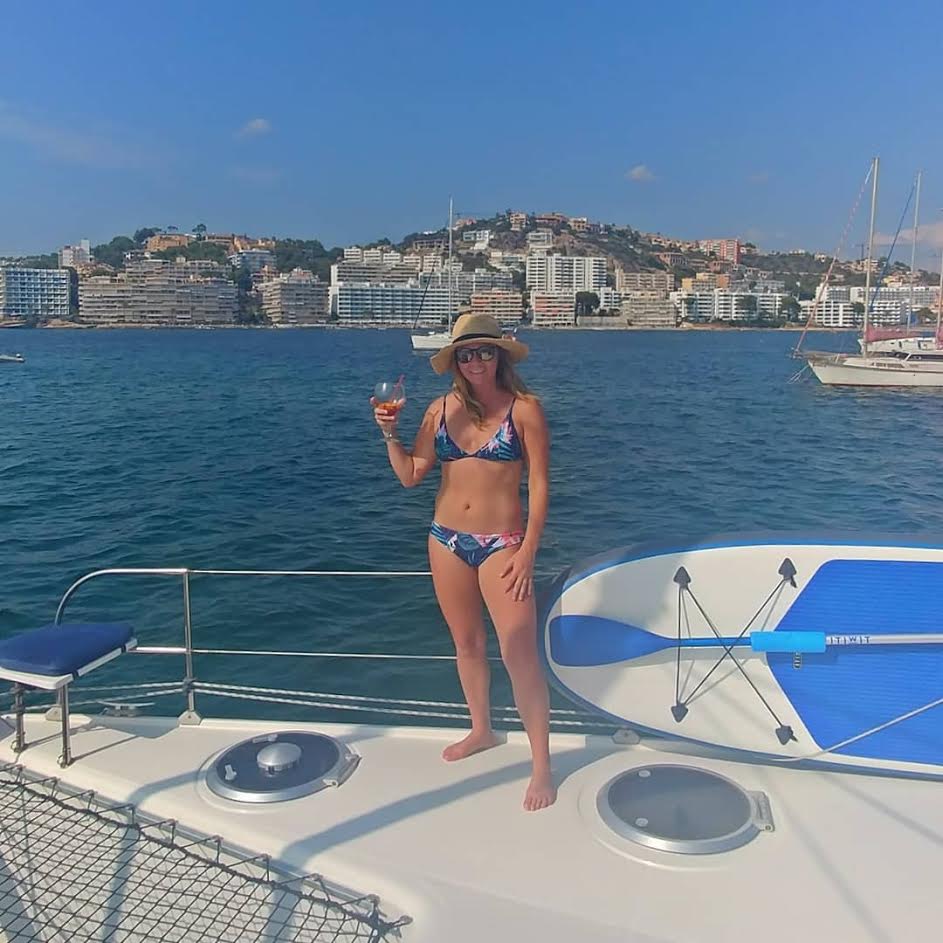
Anything else you want to add.
Being a “digital nomad” doesn’t have to be as difficult, expensive or intimidating as many people think. Throughout my travels I have met people of all different backgrounds, careers, ages, relationship statuses, etc., who identified living and working abroad as a personal goal for various reasons and were able to step out of their comfort zones to achieve it.
To learn more about Croatia for the digital nomad, check out the Total Croatia Digital Nomad guide.
Are you a digital nomad in Croatia who would like to be featured in this series? Please contact us on This email address is being protected from spambots. You need JavaScript enabled to view it.
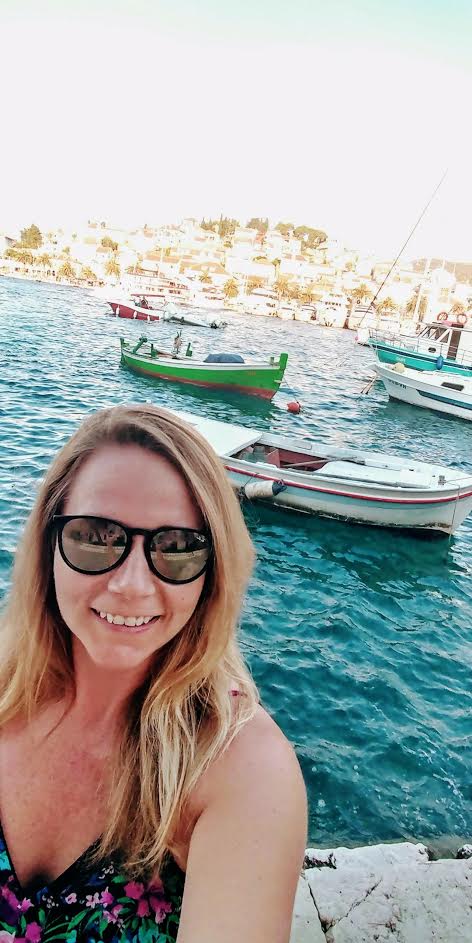
Digital Nomad Life in Croatia: Julie Odler, from Denver to Osijek
July 8, 2019 - As the number of digital nomads rises globally, some are choosing to spend some of their time in Croatia. A new TCN series meeting international digital nomads calling Croatia their temporary home. Meet Julie Odler from Denver.
As recently featured on TCN, the world is projected to have a billion digital nomads by 2035, people from all over the world doing all manner of jobs and business with one thing in common - a flexible, mobile workplace connected to the Internet. If even a fracture of that number becomes a reality, the economic opportunity for countries which can attract these wealth-generating individuals has the potential to dwarf Croatia's current tourism revenues. And there are few countries better placed than Croatia to take advantage. Safe, beautiful, great gourmet scene, top tourist destination, English widely spoken, well connected to other destinations, and a superb lifestyle.

In order to look at the issue in more detail, we have decided to look at some of the digital nomads who have Croatia in their lifestyle plan, and to find out why Croatia, what Croatia offers, and what are the things that countries should be looking out for to take advantage of this economic opportunity. I am very grateful to Tanja Polegubic from Split's waterfront co-working space, Saltwater in Split (see location below) for her help in connecting me to various digital nomads using her space.
Our next digital nomad in Croatia is Julie Odler, who is currently loving life in Osijek, a far cry from her native Denver.
You are one of a growing number of digital nomads. Tell us briefly who you are and what you do.
What brought me here to Croatia wasn't tourism, but the language itself. I just decided to learn it one day, and began studying it and speaking it whenever I could. I joke that some kind of "magical vortex" or "past life" drew me in long before my first visit here in Zagreb three and a half years ago.
This led to meeting contacts online so that I could practice the language. Some have become good friends.
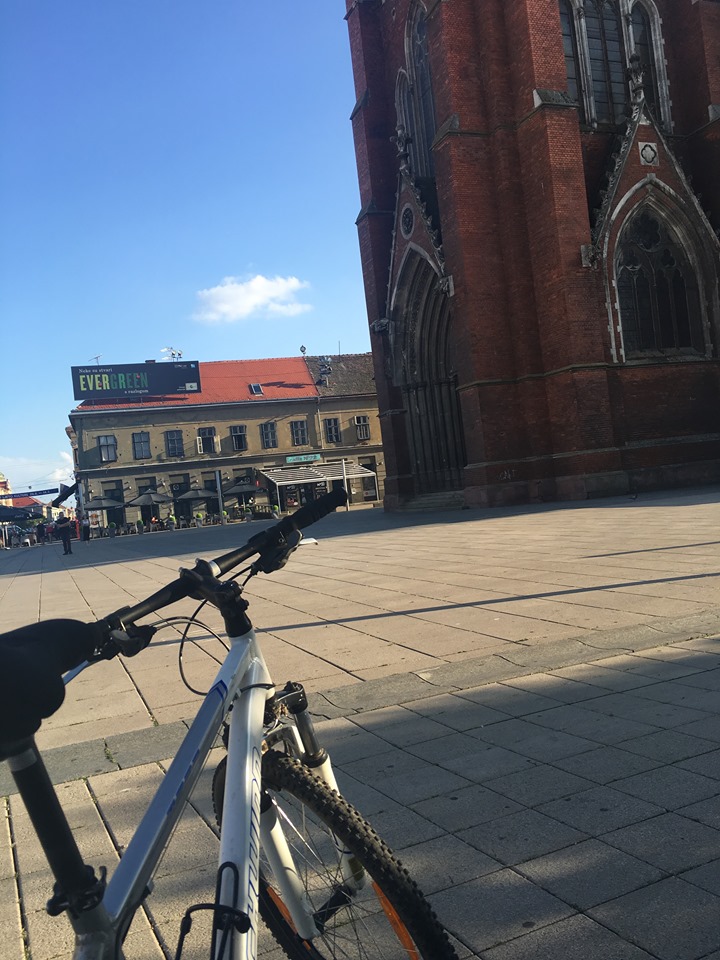
Moving also made practical sense. There is a persistent myth that you have to have a lot of money to "travel," but I made a decision that made sense for me, as a woman over 50 in the digital marketing industry. It simply made more sense for me to start my own business, (Tech and Wine Digital Marketing) and reduce my overhead and living expenses by moving out of the U.S.The timing was in fact perfect for me. 2 years ago, I sold everything I had within 3 months and found a cheap one-way flight on July 4 to Amsterdam to start my nomad journey in Europe. I've lived in or spent time in Nijmegen, NL, Buzet Istria, Trogir, Split, Hvar, Zagreb, Belgrade, Sarajevo, Mostar, Kotor, and now Osijek.
I started out with almost nothing. The process has been a challenge, and honestly, moving abroad, being a nomad, and building a business on the road has not been easy, but it has been very much worth it.
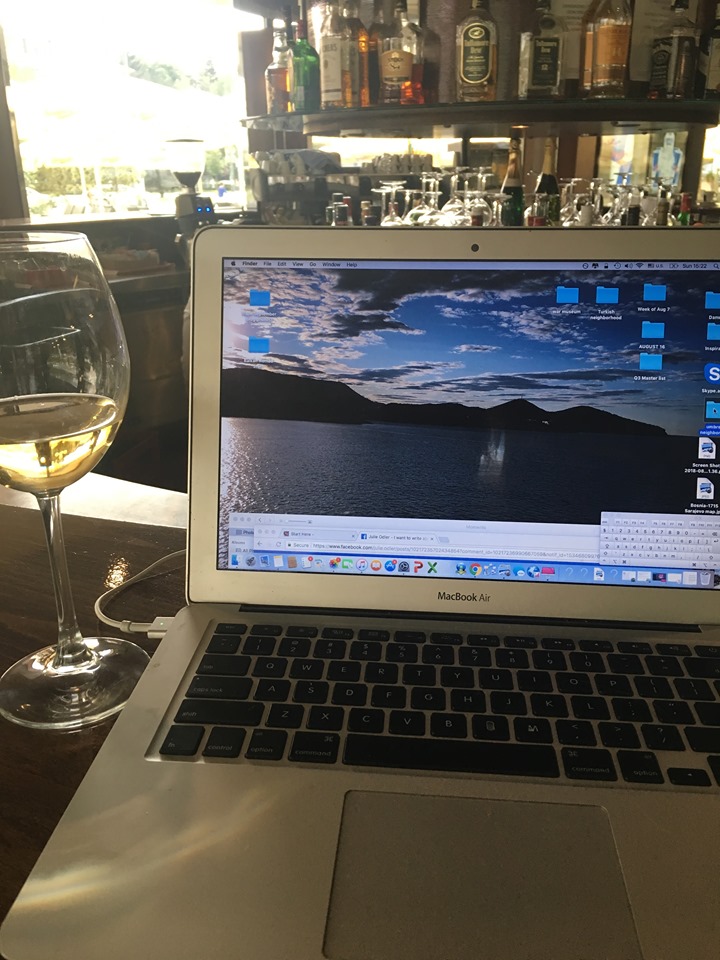
Working from your laptop rather than in an office seems like the dream lifestyle. What are the main pros and cons?
Pros:
Not having to get dressed up and go to an office every day. I can instead spend that time working! I actually love what I do and have no problem jumping right out of bed first thing in the morning to make coffee and work on my laptop.
Living in Croatia has probably resulted in creating more balance in my life. Because I love what I do, I tend to work so much I burn myself out. Now I'm more likely to take a break in the middle of the day to have coffee, go on a bike ride, go for a swim, or take a nap. The result is that I'm actually MORE productive, but at the same time I'm not living SOLELY for the sake of productivity, which is strongly ingrained in the North American culture. I feel very, very fortunate to be able to do what I'm doing,
Cons:
1. I had to learn to manage my energy and work smarter, not harder, so that I wouldn't sacrifice my health. I had to find my own rhythm. On the road this can be a challenge.
2. Not every place in Croatia is open to DN's. I tend to gravitate not only to larger cities,. but also smaller towns and villages that may not quite be aware of the concept of remote work. I've been turned down a few times when seeking apartment rentals because the landlady assumed that I didn't have a "real job."Sometimes it seems like I still have to answer a lot of repetitious questions like "Where do you work?" Who do you work for? Why Croatia, and not the U.S.?" from strangers to explain my living and working arrangements, although most of the inquiries arise from simple curiosity. My standard reply is now "I build websites" and that seems to work when I'm not in the mood to go into it. There are some I've met who can't quite wrap their head around entrepreneurism, let alone digital nomadism, but there are also many who not only get it, but are progressive, have great ideas, or are either are entrepreneurs or think like one.
I've also had a few people ask why I'm not able to just drop everything and go out for coffee on a Thursday evening (when I may have an online meeting with a U.S. client at 7 pm CET) or just take off the entire month of August, but most people I've talked to understand. Also, sometimes you do
have to work when others are winding down for the day, but it has not been a huge issue for me.
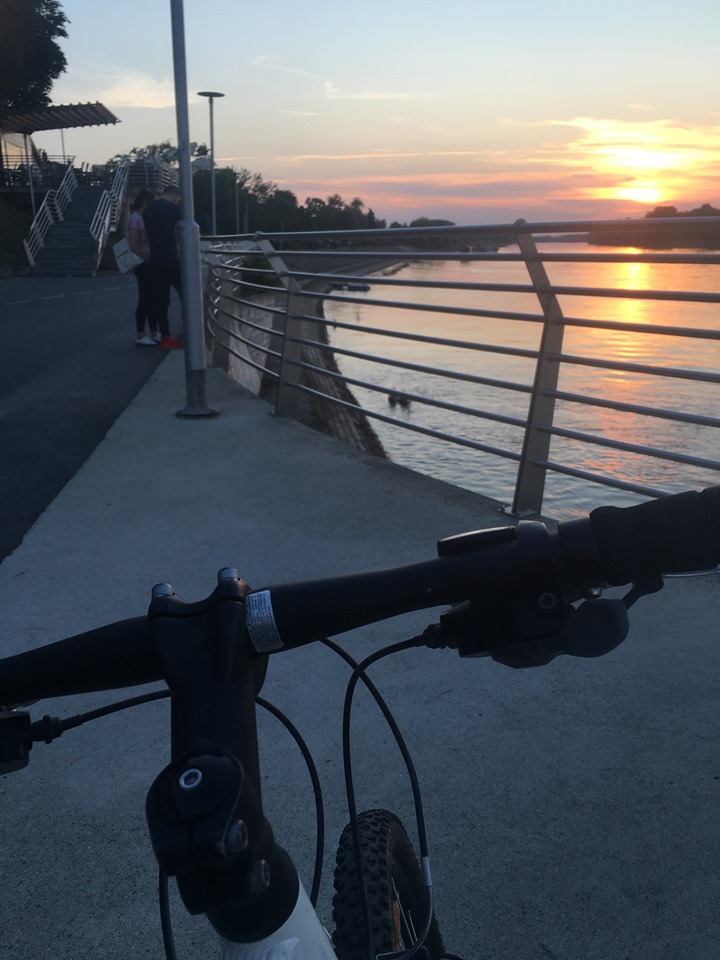
3. In some places, the weather keeps me "trapped" indoors, since I don't have a car. I'm talking the coast, where the Bura can be brutal. So I really have to be mindful and find creative ways to stay active, especially in the winter.The PRO that trumps them all: All these cons and sacrifices are ok with me. I can walk to a beautiful old city, (Tvrđa) right now. As in walk away from my laptop for an hour to take a break at a cafe there. I can easily ride a bike to Kopački Rit, which is a beautiful wildlife preserve not far from Osijek.
Life for a DN is not about being on an endless vacation. It can get stressful at times. There are sacrifices. However, actually LIVING in a place that many people only dream about visiting is priceless and wonderful. The friends and the people I've met, and the adventures I've had and the stories I have to tell.. I can't put a price on those either!
It goes beyond being a tourist, though. This is also now my home, and that also has a lot of meaning to me that is hard to put in words at the moment.
Laptop living gives you the freedom to travel and choose your place to live. Where are the global hot spots currently for digital nomads?
The only other place that really spoke to me was Arnhem, NL, which has a few workspaces that also offered healthy food and plenty of coffee. Maybe I have a thing for bike culture, rivers, bridges, and towns with a cool vibe. Except that I never could grasp Dutch, and I don't do well with short, dark, winter days.
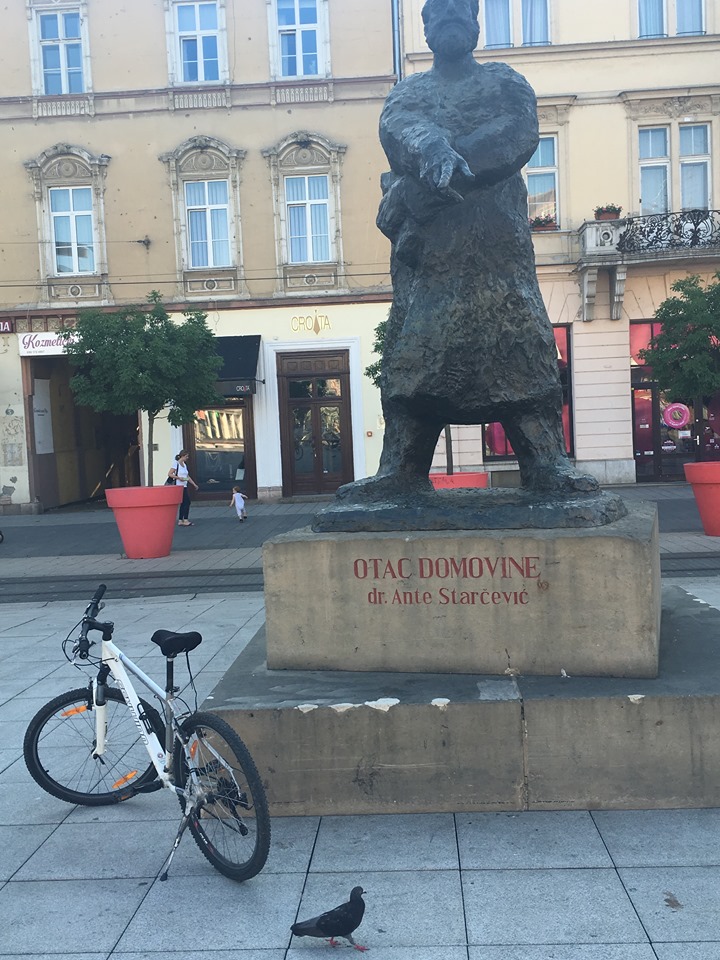
You chose Croatia and specifically Osijek - why?
Again, it could be a long story, but here I am.As a digital nomad, I've found it to be the most "livable" place in Croatia, based on my own "livability" index of course.
It has a bike-friendly infrastructure. It's easy to get around and has an excellent public transportation system which is a breeze to navigate. It lacks big crowds but is still vibrant, with an abundance of culture and beauty, nature, healthy food, gyms, a low cost of living, and just an overall good "vibe."The wifi here is probably the best I've experienced anywhere, including the US and NL, for real. However, to be honest, if you are an Apple user and need tech support, your best bet is still going to be Zagreb, which is still less than a few hours away.
It is centrally located, with easy and quick access to Zagreb, Belgrade, Sarajevo, and Budapest.
To me, it's still a bit of a "well-kept secret." It's unpretentious and reasonably priced for what you get, in my opinion. I prefer a place where you can easily find interesting things to experience that aren't about "being entertained" by tourist traps or cafes and bars that try too hard to be cool. It's easy to just relax here, live more like a local, and never get bored.
Being a nomad and building a business on the road can be exhausting, and sometimes I just crave peace and quiet. I have to admit that came here expecting it to be "pleasantly boring" and a place to get a lot of work done till I made my way back to Sarajevo.
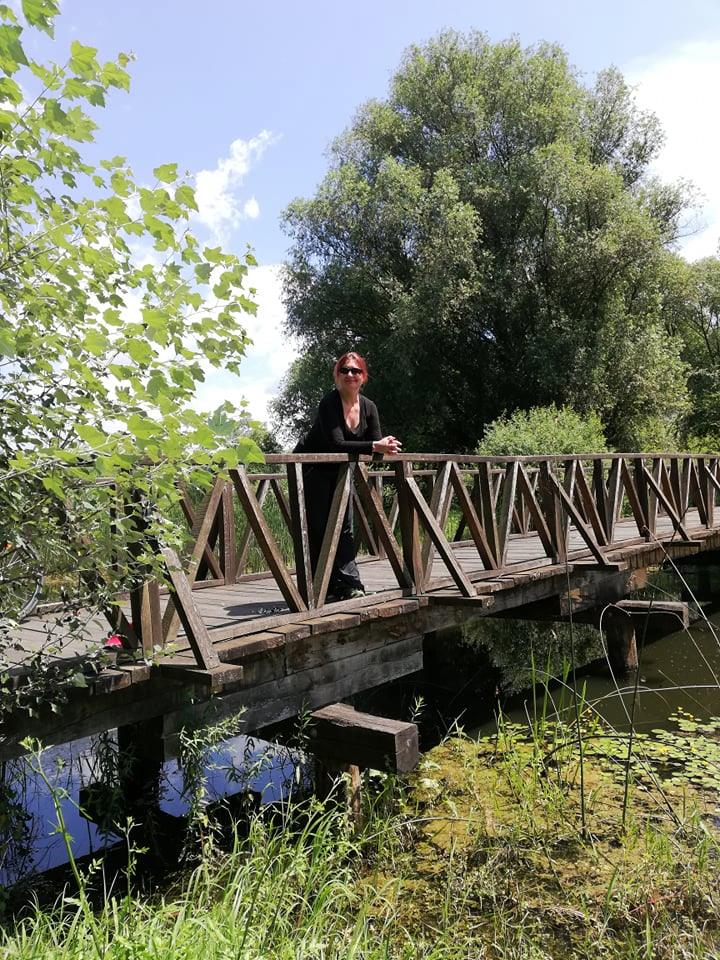
But it surprised me in many ways. For one, it is NOT boring at all. There are often live bands playing in or near my neighborhood, including well-known bands like Hladno Pivo. There was a huge BMX and skateboard competition I could walk to in 15 minutes. It seems like there is always SOMETHING interesting happening and indeed there is a lot of history and culture here.
Still, peace and quiet is not hard to find. There are no crowds, with plenty of greenery all around.We even have a "Riva!" It's not Split, but I like it. It's along one of the major bike paths. After a long ride, just hop off the bike, park it next to a table, and order a drink and watch the sunset on the Drava or gaze at the beautiful pedestrian bridge, which is lit up with vibrant color at night. (Tip: bring mosquito repellant in the height of summer)I was also surprised by the beauty of the farmland, which is a short bike ride west, and often take evening rides to the neighboring village of Višnjevac along a gorgeous and peaceful bike path.
I also prefer snow, rather than cold rain and high winds in the winter, as it is less likely to keep me inside. This is another reason I chose Osijek over the coast, although I still adore Dalmatia.
If you like bird watching, craft beer, or wine, you will be in heaven here. Kopački Rit is easy to get to via bicycle, although it helps to have a guide (friend) to get you there the first time. Wine is also a big deal here, and I can’t wait to experience more of it.
I think Osijek has been very good for me. It also helps to have friends that get me out of the apartment for coffee or lunch, and I've been fortunate to have made friends here rather effortlessly.
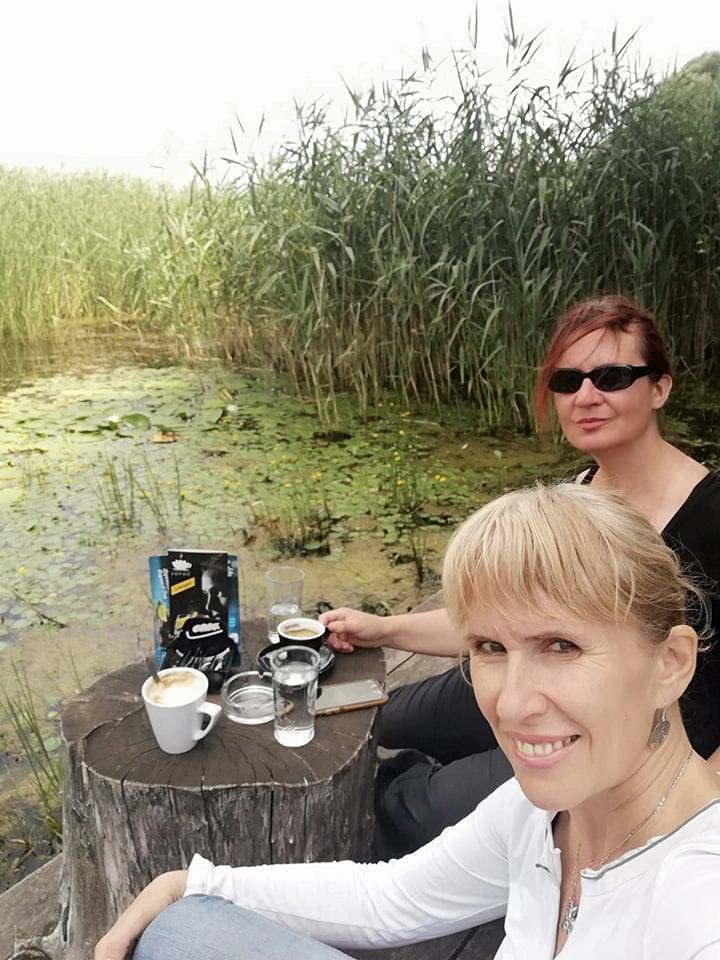
What are the most important things a destination should offer to be most compatible for the digital nomad lifestyle, apart from that all-important good WiFi?
The most valuable resource I've had is friends and contacts who really seem to understand my lifestyle rather quickly, which I appreciate profoundly.
If you have a Croatian friend, this can be very, very helpful. (make sure to do something nice for them too!)
One way to attract more DN's is to make it easy for us to find affordable housing year round.
Many of us don't need or want anything fancy, and we don't have the same needs as a tourist. I personally avoid Airbnb, 3rd party booking services and agencies because I don't want to pay fees every 3 months or inflated tourist prices. I use local listings in Njuškalo, or my growing network of personal contacts.I prefer to use Viber and Whatsapp because I like to make arrangements before I move.
For me, the basics for setting up a home "office" include a spacious table or desk, a comfortable chair, (not the couch and the coffee table, those may never even get used) space to do yoga, an outlet with a surge protector near the table, a modem that can easily be reset if need be, and some lighting sources besides the harsh overhead light, such as a table lamp.
Everyday eateries that offer options that are healthy, affordable, diverse, and accessible can make or break a decision to stay in a particular destination, at least for me.
Overall, we as digital nomads are guests in a particular country or destination and don't demand special treatment, but I for one am thrilled when people "get" us, meaning MUP/police station employees, landlords, mobile service providers, laptop service and repair shops, banks, and people in general. I hope that we can also give back, and it's something I enjoy doing in whatever way I can.
What are the competitive advantages that Croatia has to attract more digital nomads?
It still blows my mind how diverse Croatia really is, within such a small geographical area. I don't think I could ever get bored here. I'm sure many articles have covered the low cost of living, the diversity of nature, the culture, the beautiful sea, and the opportunities to be active. I could blog for a whole year about that.
I also think that Croatia is just RIPE for digital nomads and slow-travellers. The timing is good.
Another advantage: It's easier to position yourself in a non-Schengen area, at least part time, when you aspire to be a digital nomad in Europe. For some that could be the main motivation for coming here.
On more of a romantic level, I think the vibe here just suits many people. Sure, there are plenty of places all over Europe with beautiful old city streets and beaches and food and such. But many people that come here fall in love with it, or are drawn to it, like I was, for no particular reason, or for a thousand little reasons. It's just a cool place. To je to.
If you would like to follow my journey, I’m about to (finally!) launch my new blog, The Balkan Nomad. My digital marketing company, Tech and Wine, has also done websites and content marketing for the tourism industry.
To learn more about Croatia for the digital nomad, check out the Total Croatia Digital Nomad guide.
Are you a digital nomad in Croatia who would like to be featured in this series? Please contact us on This email address is being protected from spambots. You need JavaScript enabled to view it.
Want to learn more about Osijek? Check out the Total Croatia Osijek in a Page guide.

